

DECEMBER 2024
BRIDGE TO THE NEW YEAR





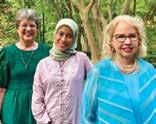

KAPPAN EDITOR
Joanne Grimm, CA Alpha Alpha
KAPPAN TEAM
Susan Pelchat, CT Mu
Shannon Lorenzo-Rivero, TN Chi
Betty Sherrod, VA Gamma Omicron
Susan Whelan, NJ Kappa
Julie Kinder-McMillan, TN Alpha Gamma
Gwen Steele, NE Kappa
Daniel LaBorde, Digital Communications Coordinator, Int'l HQ
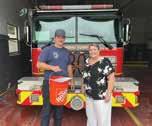
“Cheers to another new year and another chance for us to get it right.” ~OPRAH WINFREY
KAPPAN EDITORIAL BOARD
Ann Marie Brown, International President
Conway Blankenship, International President-Elect
Mollie Acosta, Immediate Past International President
Christi Smith, Executive Advisor
Pam Collins, Headquarters Director

Alpha Delta Kappa empowers women educators to advance inclusion, educational excellence, altruism and world understanding.
The KAPPAN magazine is published quarterly by Alpha Delta Kappa, International Honorary Organization for Women Educators. Find the KAPPAN Publishing Guidelines online at www.alphadeltakappa.org.
Alpha Delta Kappa International Headquarters: 1615 W. 92nd St., Kansas City, MO 64114-3210 (816) 363-5525, (800) 247-2311, Fax (816) 363-4010
email: headquarters@alphadeltakappa.org www.alphadeltakappa.org
The opinions expressed herein are those of the individual authors and are not necessarily in conformity with those of Alpha Delta Kappa or the editor.
The deadline for the March issue is January 1, 2025. Share with our readers how your chapter plans activities and programs that include members of all ages and physical abilities. How and what do you learn from each other?
Please include your name, chapter, state, province or nation, your office, and a way we can reach you if there are questions or more information needed.
To submit articles/photos, go to the A∆K website >About>Publications>Submit to the KAPPAN. Follow submission guidelines on the submission form.
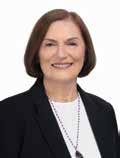
Ann Marie Brown
I’ll bet you thought there were only four seasons: spring, summer, winter, and fall, which some call autumn. Guess again. There are five seasons. The fifth is the season of giving, often called the season of year-end giving. Right now, we are in the middle of it. Thirty percent of donations to causes and charities are made between October 1 and New Year’s Eve, the reason for the name.
In this giving season, we wrap boxes in festive paper and struggle to tie the perfect bow. We write checks to our favorite charities and causes, drop canned goods in our neighborhood’s “Feed the Hungry” barrels, and purchase an extra toy or warm sweater for an underserved family. Reading about the chapter altruistic projects in this magazine clearly shows the giving nature of our members. That “giving nature” knows no season.
A gift can mean something besides the sweater you wrapped for your mother or the lilac candle you unwrapped from your best friend. A gift can be something other than what you give or get. It is also something you already have. It is the natural ability that comes easily. Everyone has one of those. It can be perfect pitch, remembering birthdays or baking without looking at a recipe. It is something you do almost without thinking. Where did it come from? Does it matter? It is the gift given to you. It is yours to share with the world or keep to yourself.
A natural ability differs from having a talent or a skill. A talent is a skill developed through practice and use. Whether we know it or not, along with our natural abilities, we all have a talent for something. The sister who organizes the refreshment committee has a gift for convincing others to participate and a talent for organizing. The singer with perfect pitch takes vocal lessons and turns her gift into a talent for entertaining.
Working as a team, communicating, being patient, and being creative are also abilities. In A∆K, there are many opportunities to share our abilities and sharpen our skills. Serving as a committee chair, presenting at the Educational Symposium, or introducing fellow teachers to our organization are some ways to use those abilities. So are loading backpacks with nutri-
tious food, donating books for a classroom library and awarding scholarships to students planning to enter the education field. The women who offer for an A∆K International office share their abilities with all of us. You can do that too.
We’ve all heard the excuses. “I get nervous when I speak in public.” “I’m no good with numbers.” “Ask Mary or Janie or Betty. They’re better at it than I am.” Remember, you don’t get good at something if you don’t try it. As some athletes said, “You won’t get a hit if you don’t swing.”
The Rev. Dr. Martin Luther King Jr. said, “If you can’t fly, then run. If you can’t run, then walk. If you can’t walk, then crawl. But whatever you do, you have to keep moving forward.” We use our gifts and abilities to do that.
Contributing to the A∆K Foundation is a way to share your gifts. Donating to scholarships, altruistic projects or sisters in need are worthy of your end-of-year gifts.
When we share our gifts and abilities, we contribute to the world. And we, too, benefit. Science says that the act of giving activates the brain’s reward center, producing feelings of pleasure and happiness. We get vicarious feelings of love and affection, joy and compassion, gratitude and warmth. Sharing makes us feel good. Who doesn’t want to feel good?
December 31 is officially “Make Up Your Mind Day.” It is the day for making decisions, taking a side and committing to a position. It is not a day to make those New Year’s resolutions that are usually broken by Valentine’s Day. It is the day to decide whether to follow through on commitments.
Take that brand new, clear 2025 calendar and mark the dates for your chapter meetings, conferences, and conventions. Flip the pages to July 10-13 and mark the International Convention in big red letters. Commit to sharing your gifts and abilities with your sisters, your community and your world.
Mahatma Gandhi said, “Be the change you want to see in the world.” That is the purpose of gifts, abilities, talents or whatever you call them. Let’s make this season of giving last all year. Share your gifts. Add to your abilities. This year, let’s all unwrap our special gifts and use them to be the change we want.
Happy New Year to you and yours.


By Northwest Regional President-Elect Nancy Dreydoppel, Northwest Regional Vice President for Membership Virginia Howard, and Northeast Regional Vice President for Membership Gay Toomy
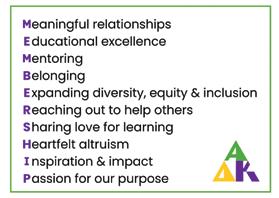
Why did you become a member of Alpha Delta Kappa? Why do you remain a member? The International Membership Committee asked these questions to sisters throughout our seven regions and received various answers. Their responses demonstrate that not every member’s “why” for joining is the same, and their reasons for remaining a member also vary. Below are some of the responses:
• Like many others responding, Laura Lewis (OH Alpha) joined because a close friend or respected colleague invited them.
• Tiffany Carr (VA Alpha) had heard about A∆K from college friends teaching in other places, so she sought the opportunity to join where she was teaching.
• Jill Love (WY Delta), Shannon Johnson (MA Mu), Gayle Lord (WY Gamma) and Marg Nieradka (Ontario Sigma) are following in the footsteps of their mothers who are or who were members.
• Barbara Havens (VA Gamma Kappa) was interested in the scholarships offered.
• Dianne Soltess (MB Beta) became a member because she was impressed with the organization’s pillars and was excited to reconnect with former colleagues and acquaintances.
• Lucy Fisher (TX Epsilon Pi) wanted to meet and collaborate with teachers from different schools and backgrounds.
• Shirley Dezarn (KY Alpha Eta) said that it was an honor to be asked to join. Membership gave her the opportunity to meet and associate with other educators she might not have met, especially since she was not originally from Madison County.
• Recently initiated members Judith Bonafaci (WA Alpha
Alpha), Sharon Miller (MN Alpha Alpha), and Doreen Williams (GA Alpha) all shared that they were looking for opportunities to be involved in their retirement years.
• Randy Couch (VA Alpha Lambda) said that during her first visit to a chapter meeting, sisters were packing books and supplies for a school damaged by Hurricane Floyd. She wanted to belong to this organization of educators whose focus was altruism and paying it forward. She remains a member because of valued friendships and good deeds accomplished.
• Golden Sister Marilyn Nigro and Pearl Sister Lori Mertes (both AK Gamma) value support from their sisters and feel they do not stand alone.
• Amy Leitze (IN Beta Epsilon) continues her membership because of her strong connections with Collegiate Club members at Ball State University.
• Tatiana Chauvet-Martin (HI Nu) believes that educators have a unique opportunity to make a positive impact on the world, both locally and globally. As a member of A∆K, she is excited to contribute to these efforts and connect with likeminded professionals.
• Pat Palmer (JA Eta) says that she remains a member mainly because of the love, fellowship, and concern for each other, for the knowledge gained year after year on a broader scale, and for the opportunities to grow and bloom.
Sisterhood, networking, altruism, helping classroom teachers and learning from others are among the repeatedly cited reasons for remaining members.
To build sustaining strength within a chapter, members need to be guided to feel a sense of belonging, find value in their membership, and hone their “why” for joining. Seeing how varied the reasons for joining and remaining as members are, this is no easy task. It is, however, a very necessary one that requires vigilance and frequent checks. Research has shown that members who do not find value will leave an organization. To keep members, chapters must understand members’ needs and develop plans accordingly. This can be done through discussions and surveys. As needs shift, that might mean changing some long-held practices, some experimentation or trying new ways of accomplishing things to reach all members.
Your state, provincial, national (S/P/N), regional and Inter-
national leaders are currently reading “Membershift” by Sarah L.Sladek. Sladek has done extensive work with the needs and values of each generation (Silent Generation, Baby Boomers, Generation X, Millennials/Generation Y, and Gen Z) as it pertains to membership organizations. The impacts of cultural and historical events, along with technological advancements, have influenced the needs and priorities of generations in different ways. The decline in membership for established organizations is well documented and researched. This is true for A∆K.
To keep members, chapters must understand members’ needs and develop plans accordingly.
We are losing both members and chapters at an alarming rate. Our Founders began A∆K during the post-war era when communities were rebuilding and reconnecting, and membership organizations boomed. Sladek writes, “Membership has
changed over time, requiring associations to also change and reexamine how they inform, inspire, and otherwise align people to their missions and the critical work they do.” The good news is that the desire to belong has not changed since the founding of A∆K in 1947.
“Belonging is something we all want and need. It’s human nature to want to be included and feel we’re part of a community, that we’re building connections and making a difference. Membership still matters; it’s the needs and interests of members that have changed,” Sladek wrote. A∆K leaders at all levels look forward to exploring those interests and needs and finding ways to adapt those findings to strengthen A∆K for present and future members.
by Julie Brown, International Fraternity Education Committee Chair
Why is Alpha Delta Kappa important to you? How does Alpha Delta Kappa enrich your life and your community? What is your favorite or most meaningful aspect of Alpha Delta Kappa?
The answer to any of these questions is… FRATERNITY EDUCATION!
For the past year, the new Fraternity Education International Standing Committee has pondered these same questions. You may have heard about the leadership strategy where members “get off the dance floor and look down from the balcony.” This means that as our new International Committee got underway, we “got off the dance floor” of thinking about individual fraternity education activities, and we “got up in the balcony” and pondered just why fraternity education is important and what meaningful fraternity education activities can bring to a chapter and each member.

So, when the committee was “up in the balcony,” what did we see? We saw the importance of bringing concise, accurate, fun and quick fraternity education activities to chapters so that every chapter meeting can
be enhanced with something quick and interesting. What kind of fraternity education activities meet these criteria? That is the question that we pose to each member. What is most interesting and meaningful to you? What aspects of Alpha Delta Kappa do you want to learn more about? Do you have an idea for a quick and interesting fraternity education activity?
Every member may submit a fraternity education resource to the International Fraternity Education Committee for possible posting on the International website. To enter a submission, go to the International website and click on Members Only/Resources/All Members/Membership/Fraternity Education/ Submitting New Fraternity Education.
The availability of fraternity education resources and activities will only be as extensive as members’ submissions of their activities. We know that every chapter wants interesting and useful fraternity education activities for use during chapter meetings, so let’s all share our great ideas.
Julie is Southeast Regional President-Elect and a member of KY Alpha Eta.

By Barbara Stanfield, 2021-2024 A∆K Foundation Board Member
How exciting it is when one of our family members declares an interest in becoming an educator, and our excitement builds as we watch his or her progress along that path! Wouldn’t you enjoy telling family members about a scholarship for which they are eligible simply because you, their mom, aunt, or grandma, are a member of Alpha Delta Kappa? Well, now you can!
If you attended a regional conference this summer, you heard about a new scholarship, the Legacy Scholarship, in “The ABCs of the Foundation” report.
While Alpha Delta Kappa has numerous scholarships that serve a variety of purposes, the new Legacy Scholarship is unique. It is intended to help a current Alpha Delta Kappa member’s child, stepchild, adopted child, grandchild, great-grandchild, nephew, niece, grand nephew or niece who has attained junior or senior status in a bachelor’s degree program or is pursuing a master’s degree in the field of education.
This $2,000 scholarship will be awarded once a year in the spring. Applications are due March 1st each year. Specific information to apply is available at alphadeltakappa.org/Foundation/ Grants and Scholarships/Legacy Scholarship.
The International Executive Board is eager to create new scholarship opportunities for individuals going into education. Through generous donations to the Alpha Delta Kappa Foundation by members, the Foundation can fund these scholarships. Funds for the Legacy Scholarship will come from donations and can be designated for that purpose at any time. A member may make arrangements to donate to the Legacy Scholarship or leave a gift when she has joined the Omega chapter. A member’s family or Alpha Delta Kappa sisters can always make a gift to the Legacy Scholarship in a member’s honor or memory.

By Ellen Roderick, A∆K Foundation Board Member
What a real joy it was to meet and interact with so many members attending our six regional conferences this summer. The Alpha Delta Kappa Foundation Board extends its heartfelt thanks to sisters who donated to the Foundation either on-site or when registering for the conferences. A total of $11,910 was collected this summer to support our scholarships, grants programs and major altruistic projects. Beyond the financial support, warm thanks are extended to all who stopped by the Foundation table to learn more about Foundation initiatives and how they can be of support.
It was a rewarding experience for the Foundation Board, which was made possible only through the tremendous support provided by the seven Regional Presidents and their conference chairs. Without their generosity in terms of time on the agenda and space to meet with sisters and conduct a workshop, we could not have spread the word about the Foundation. At each regional conference, a Foundation Board member presented “The ABCs of the Foundation” during a plenary session. Members now have access to a PowerPoint to educate their chapters about the benefits of the Foundation.
Board members attending each conference conducted a workshop,“Behind the Scenes of the Alpha Delta Kappa Foundation.” Each workshop featured five to eight members who spoke about how they have personally and professionally benefited from the Foundation through its many programs: Leadership Academy, Excellence in Education, Disaster Relief, International Teacher Educator, or Scholarships and Grants. These panelists were awesome in describing how they became a part of the programs and how the programs or support have enriched their lives. Again, the Foundation Board extends kudos and thanks to our panelists who made the workshops an enriching experience for all attendees.
Do look for us in Austin. We are planning a fully staffed Foundation Table, an Evening of Entertainment to support the Foundation, a social gathering to thank our major donors, and a workshop focused on the Foundation’s programs. We hope to renew friendships and make new ones during our 34th International Convention.
Presenters of “Behind the Scenes of the A∆K Foundation” at the Northwest-Southwest Conference are (L to R) Sadrina Dorn (WA), Karyn Lanham (NV), Kelly Garey (ID), Ellen Roderick (MD), Mollie Acosta (IEB), Michelle Roosma (AZ), Carol Stern (WA), Susan Okano (HI).
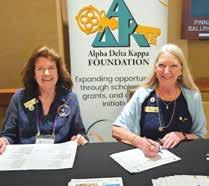
Congratulations to the candidates for International offices. The International Candidate Qualifications Committee has certified them.
International President-Elect:
Mary Ey, OH Lambda
Charlene Lauria, CT Kappa
Ann Quinlan, NE Beta
Four-Year Member of the International Executive Board:
Ginger Greene, WV Alpha Tau
Lottie Roy, FL Epsilon
Rachel Shankles, AR Alpha Epsilon
International Vice President for Membership:
Kathy Beatty, VA Gamma Epsilon
Two-Year Member of the International Executive Board:
Marla Hayden, KS Rho
Leslie Koenck, LA Alpha Sigma
Gena Richardson, KY Kappa
Alpha Delta Kappa International dues are due January 1, 2025. To avoid a $5 late charge, they must be paid online or postmarked by January 31, 2025. To pay International dues online, follow the directions below.
1. Go to alphadeltakappa.org
2. Sign in.
3. Hover over Members Only and click Profile.
4. Click Pay Membership Fees.
5. On the RENEWAL screen, your fees will automatically be updated.
6. Click on the Voluntary Donation and fill in each donation of your choice. The subtotal will update as contributions are chosen.
7. Click Add to the cart and scroll to Transaction Grand Total.
8. Enter credit card or PayPal information.
9. Click Submit Order.
Or, payment may be made to the chapter treasurer, who will then pay International dues with a chapter check. If dues are not received, membership is suspended on March 1.
Address questions about paying S/P/N or chapter dues to S/P/N or chapter treasurers.
Each biennium, Alpha Delta Kappa members may propose altruistic projects that are 501(c)(3) charities. Members may propose current projects, such as the Alzheimer’s Association and St. Jude Children’s Research Hospital, and new projects. Individual members, chapters, S/P/N presidents, or International Executive Board members may submit proposals. Several proposals were submitted electronically by the October 15, 2024 deadline. The International Executive Board will review those proposals and select up to three for member consideration. Summaries of the proposed projects will be published in the March 2025 KAPPAN. All members will have the opportunity to vote for two of the project proposals. The vote results will be announced before or at the International Convention. For more information, visit the Alpha Delta Kappa website: www.alphadeltakappa.org > Foundation Tab > Altruism.
Members of the International Executive Board, Regional Leaders and the Alpha Delta Kappa Headquarters staff participated in the third annual Leadership Summit in Kansas City in September. During the two days of meetings, the attendees heard presentations on culture, regional structure, mentoring, membership growth, regional conferences and the 2025 International Convention in Austin, TX. Continuing with the Shared Leadership model, the Executive Board shared responsibility for the presentations.
“All presentations were thought-provoking and will help to “Bridge to the Future” of Alpha Delta Kappa,” said Immediate Past International President Mollie Acosta.

Sharing leadership at the Summit are (L to R) Headquarters
Membership and Marketing Specialist Phyllis Robinette, Gulf Regional President-Elect Barbara Stainback, Northeast Regional President Sue McDowell, and Southwest Regional PresidentElect Nancy Martinez.
By Judy Tate ITE Board Chair, VA Tau
The International Teacher Education Board introduces four second-year scholars and three first-year scholars. Meet the newest International Teacher Education (ITE) scholars.
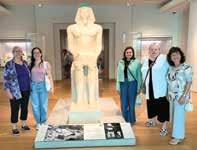
Alejandra Coz's journey has taken her from her undergraduate class in Lima, Peru, to Harvard’s Graduate School of Education, where she is working on a master’s degree focused on designing and delivering innovative e-learning experiences for higher education students in Peru and Latin America. MA Mu co-sponsors are Sara Kelly and Nancy Tucker. To balance her often stressful graduate school academics, Alejandra is pursuing a master’s degree in education.
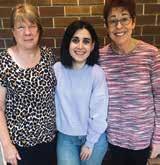
Meri Kadagidze, the first ITE Scholar from Georgia, is already impacting her nation at the policy level. Her publication, “History of Education in Georgia,” reflects the comment made by one of her recommenders that she is “a true hope for the education system in Georgia.” Her goal is to attain a master’s degree in Education Policy and Social Justice at the University of Washington and to return home to create a new rural education paradigm in Georgia. She appreciates the generous support she receives from sponsors Sue Downing and Kathy Fleming of WA Beta Iota.
Shehneela Naz left her position as a senior lecturer at Brac University in Bangladesh to enhance her skills in educational technology and curriculum design, hoping to bring a more interactive and practical approach to English language learning to her home country through graduate study at the Univer-

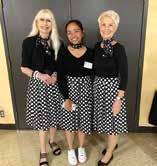
sity of Illinois, Urbana-Champaign. Her sponsor, Valerie Johnson of IL Xi, welcomed and helped her set up her new residence and open a bank account. Valerie assures that Shehnella has fun outings, such as casual afternoons at the movies
Marie Rementina traveled from her home in the Philippines to her new home at the University of Minnesota to pursue a master’s degree in special education. Rose’s dream is to pioneer the establishment of a well-rounded learning and training institution for diverse learners and to fill the gap between special education and inclusive employment in her nation. She has become so close to supportive co-sponsors Kathi Treston and Mary Abuan of MN Alpha Alpha that the three women have become the “triplets.”
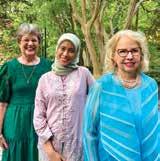
Sarah Pradoto’s support comes from co-sponsors Karen Wamsley and Kay Isley both of GA Psi and enthusiastically bolstered by GA PSP Debbie Boswell. Sarah has spoken and presented throughout Georgia and the Gulf Region where sisters have been charmed and inspired by this scholar from Indonesia who left her position as a kindergarten teacher to study for her master’s degree in Early Childhood and Elementary Teacher Training at the University of Georgia.
Daw Sing Nue Marma from Indonesia is following her dreams at the University of Cincinnati. Before coming to the
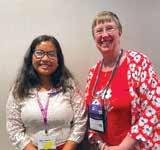
Daw Sing Nue Marma (L) with Co-sponsor Denise Sontag, Co-Sponsor Lori Gehr (not pictured) both of OH Alpha
U.S., she worked to extend educational opportunities for refugee children from neighboring Myanmar through international nongovernmental agencies such as UNICEF and Helen Keller International. Co-sponsors Denise Sontag and Lori Gher of OH Alpha ensure that Daw Sing has varied experiences with sisters across Ohio.
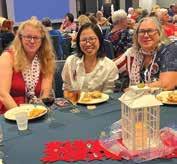
Phuong Pham traveled from Vietnam to Teachers College, Columbia University in New York to concentrate on International Educational Development. She was a key contributor to the establishment of a new online university in Vietnam designed to spread the collegiate experience across the nation. She was also the founder of a nonprofit in Vietnam aimed at preserving an important natural part of the environment. Her NJ Epsilon co-sponsors Marie Arnold and Doris D’Elia include her in family celebrations.
Since its inception in 1961, the ITE Scholarship Program has differed from other scholarship programs worldwide. The difference? The enthusiastic support of A∆K sponsors and the entire A∆K community provided each scholar opportunities to cross the bridge of international friendship into the welcoming arms of A∆K members. Through the past seven decades, about 250 women educators from about 70 nations have received that welcome to the United States to pursue their education dreams. Seven ITE Scholarships are awarded annually through the A∆K Foundation to help support those dreams. Each of the chapters supports those dreams through the $20 ITE fee included with chapter dues. The combination of funding and the warmth of sisterhood provide the difference that builds lasting bridges of friendship and support.

Chairman Patricia Valle, WA Alpha Delta, invites members to read “Just Mercy: A Story of Justice and Redemption” by Byran Stevenson and participate in a Zoom discussion group on January 9, 2025.
“The book, a memoir, focuses on justice and racism. Having grown up in a community with very little diversity, I found the book fascinating and a bit disturbing, knowing that so much prejudice exists in other sections of the country,” said Sue Whelan, NJ Kappa, who reviewed the book for the KAPPAN
“Stevenson became a lawyer after graduating from Harvard Law School. The first chapters describe how he began his career as a lawyer for the poor in Georgia before moving to Alabama and founding the Equal Justice Initiative. The book alternates odd chapters between Stevenson’s efforts to overturn the wrongful conviction of
Walter McMillian and his work on many other cases of prejudicial arrests. In addition, he details his founding of the Equal Justice Initiative, which arose from his internship in Georgia, where he met with death row inmates. Throughout the book, the prejudicial treatment of people of color is documented.”
“Just Mercy” was published in 2014. In 2015, Stevenson was awarded the Andrew Carnegie Medal for Excellence in Nonfiction, the Dayton Library Peace Prize for Nonfiction and the NAACP Image Award for Outstanding Library Work in Nonfiction. The American Library Association named it a Notable Book.
If you want to join the group, check CONNECT for the Zoom link for the 4 pm PST January 9 discussion group. In November, “The Family Outing” by Jessie Hempel, a book about LGBTQ+ and mental health issues was discussed.
By Paula O’Neill, International EiE Chairman, TX Beta Chi
Loud “Whoops!” arose around Alpha Delta Kappa world this past spring and summer when the state, provincial and national conventions first announced the Excellence in Education Award recipients. After receiving their pins and checks from the Alpha Delta Kappa Foundation, these recipients went on to their regional conferences, where more shouts could be heard and plaques and checks were awarded again. The large smiles at conferences once again showed the pride and love bestowed upon this biennium’s “brightest and best” of those nominated for the organization’s highest award offered to our members: the Excellence in Education Award.
The award is a lengthy experience with nominations beginning the fall after the International Convention, the naming of the S/P/N recipient at conventions several months later, the regional award in the summer, and then the year-long wait until the next summer at the International Convention when the seven regional recipients are presented and the International recipient is named. Those honored on all levels are thrilled with the coveted award from their beloved professional organization. You can’t help but smile back at these photos as you see the joy and pride on the faces of our sisters.

A hurricane caused an upset in the Mexico sister’s plans to attend the South Central Conference in Rogers, Arkansas. So, Janet Saenz was honored at a chapter meeting with her plaque and check as her award as regional recipient. Saenz has a Doctorate in Education and her groundbreaking research validates her impactful career for over sixty years. Her work has shaped education through policy reforms, research and collaborations, focusing on inclusive learning for marginalized students: Indigenous, rural, special education, socio-economically disadvantaged and girls.
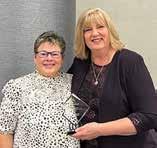
Dawn is a secondary education teacher. She says “My love of encouraging and tutoring students and transforming failures into triumphs fuels my passion for inclusive learning. As a Director of Professional Learning, I witnessed student hurdles. Witnessing the impact on struggling students, I took action and tutored 15 students who repeatedly failed the science portion. The result? All 15 passed after my tutoring. I also successfully integrated Psychoeducation students (PIC) into my class. The program’s success affirmed my belief in the power of inclusive learning for everyone.”
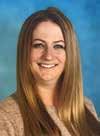
Jamie teaches second grade and said, “I serve on numerous curriculum, assessment, data and professional development committees. I present the information I learn from various workshops in a turnkey fashion for professional development. My joy truly comes from giving and volunteering.” McInerney has also been selected as a Teacher of the Year for her school.

April is a thirty-plus year experienced educator teaching sixth grade in Omaha, Nebraska. Having served on many committees in Language Arts, Math, Technology, and STEM, she runs a weekly sixth-grade news program. Bridwell also serves on the building Medical Response Team, where she has used her training to save the life of one of her students.
Northwest: Gayle Tacchini, Oregon Epsilon
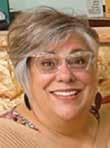
As a district leadership team member, Gayle Tacchini spearheaded reading inter-ventions for elementary students and over-sees a Title I Intervention program, help-ing students needing extra support who don’t qualify for SPED. “The most gratify-ingmoments in my career have been watch-ing my former students successfully navigate high school and beyond using the skills they have obtained through our work together. If I can level the playing field for our students,thatisagreataccomplishment.”
Southwest: Pascale Creek Pinner, PhD, Hawai'i Delta
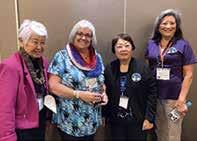
and Rae Yamanaka, HI Delta sisters of Pascale.
Dr. Pinner has taught for over 30 years and currently serves as the President of the Hawaii Science and Technology Museum Executive Board. Pinner has received many awards including the Presidential Award for Excellence in Math and Science Teaching and the Hawaii State Teacher of the Year. Most recently, she completed the Albert Einstein Distinguished Educator Fellowship in the Office of Workforce Development for Teachers and Scientists in the Department of Energy’s Office of Science.
Southeast: Colleen Spears, Tennessee Mu

Southeast: Colleen Spears, Tennessee Mu
In her day job, Colleen is a gifted education teacher at Brentwood Middle School. Previously, she taught kindergarten and first grade in Metro Nashville schools for a decade. Spears has been named the Tennessee Historical Society’s Teacher of the Year. She started a successful Quiz Bowl team at her school and enjoys providing connections for students in the middle school years. She sponsored an ITE student and attended the student’s wedding in Pakistan.

At the New York State Convention and EiE presentation, there was quite a presentation from President Betty Kulpa to Abigail Edwards, the state recipient.
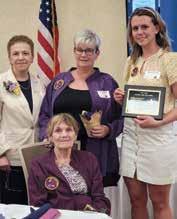
From left, President Betty Kulp, MaryJo Edwards, mother of the recipient, Abigail Edwards EIE recipient for New York, and seated is her grandmother, Sara Robins. Abigail was brought into the New York Alpha chapter by her mother and grandmother. Betty was thrilled to present the EIE award to Abigail, her former second-grade student.
Are you an A∆K trivia whiz? Try these.
1. Who was the President of the United States when the first A∆K chapter was chartered?
2. What is pledged in “The Lamp of A∆K?
3. What is the definition of biennium?
4. Is a sister who has been a member for nine years and two months a Violet Sister or a Pearl Sister?
5. What did Agnes Shipman Roberson teach?
6. What river will you see when you attend the 2025 International Convention?
7. What positions are considered the three P’s?
8. What is a CNA?
9. What is the EiE Award?
10. What movie star was an A∆K Woman of Distinction, and why was she chosen?
until she has been a member for ten years.
A Message from Melissa LaBonge, Alzheimer’s Associate Director for Constituent Events
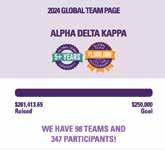
Lynda Collins and I would like to express our sincere gratitude for Alpha Delta Kappa’s partnership and the incredible effort your team put into your 2024 The Longest Day campaign. Thanks to you and your teammates, The Longest Day has celebrated another recordbreaking season with over $13 million raised and Global Teams, including Alpha Delta Kappa as a Gold Level Global Team, represented a significant part of this success.
We appreciate your members’ involvement in this meaningful cause and Alpha Delta Kappa for fostering a philanthropic culture that empowers them to make a difference. Your commitment to supporting the Alzheimer’s Association and our mission is truly inspiring. We are grateful to have you as a partner in this urgent fight, especially in this Era of Treatment.
The 2024 Global Team reports are final, and I am excited to share that Alpha Delta Kappa’s 98 teams raised a grand total of $324,891! We look forward to continuing our collaboration and celebrating more successes together in the future!
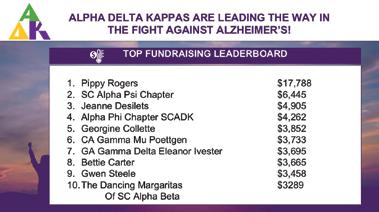
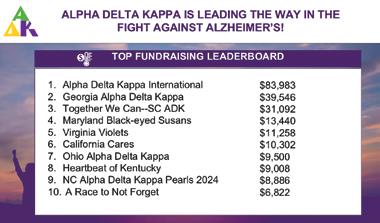
By Joyce McAloon, CT Alpha Gamma, International World Understanding Chairman
The World Understanding (WU) Program is back and ready to select a new project for 2025. The World Understanding Project program is not new to Alpha Delta Kappa. Over the years, sisters have made a difference here in the United States and around the world through this program.
The International World Understanding Committee has been busy for two years, working to improve A∆K’s commitment to projects worldwide. The committee made changes in choosing a WU project, incorporating them into the WU purpose, application and adjudication process.
International World Understanding Chair Joyce McAloon explained that changes worldwide caused Alpha Delta Kappa to stop and examine the process of choosing a World Understanding Project more closely.
The WU Project will now be announced at the International Convention instead of at the Regional Conferences. Another change is that projects cannot be affiliated with religious or political beliefs or groups. All submissions need to be a 501(c)3 nonprofit organization or be affiliated with a 501(c)3 non-profit organization in the United States.
The timeline for submissions has also changed. The WU committee received applications and adjudicated the proposals in October. The top five proposals were submitted to the International Executive Board in November. In December, IEB will choose the top three proposals to present to the membership.
All sisters will have the opportunity to vote for the World Understanding Project sometime in the spring before the International Convention.
Serving on the WU Committee with Chairman Joyce are WU Northeast Region Chair Linda Rissel, WU Southeast Region Chair Annie Evans, WU Gulf Region Chair Karen Evans, WU South Central Region Adelina Christensen, WU North Central Chair Jean Hyrich, WU Southwest Region Chair Shirley Bruns, WU Northwest Region Chair Karen Santos, International Executive Board liaison Ann Quinlan and Headquarters Liaison Pam Collins.
Chairman McAloon said the committee is “committed to our sisters to bring forth World Understanding projects for all to be part of as well as proud to help.”
“I thank our regional chairs for their hard work reviewing, updating and getting the World Understanding Program back on its feet. It was a long process with many ups and downs, but the committee is confident that we are ready. As we get closer to introducing our 2025 World Understanding Project, it is our hope that it will be supported with donations and sisterly love around our regions.”
By D’Hann Ch’ng, ON Epsilon, Ontario World Understanding Chair
When I had to share my teaching philosophy for a teacher’s college admission, I was told that my perspective on cultural and global context didn’t align with their institutional goals and could affect “measurable outcomes.” In other words, “We prioritize reputation and high grades, so no, you cannot join our faculty.”
So, I played the game. I adapted to the system. I became who they wanted me to be.
At home, the challenge was more personal. My mother struggled to understand my decision to wear the hijab in the Western world, which is fraught with misconceptions about Islam. Each conversation upon my return to Malaysia felt like a battle, leading to emotional strain. I felt as though my journey and the significance I derived were invisible to her, making it hard for us to connect. So, I took it off.
what weakens connections.
World understanding isn’t just about diversity on paper, token diversity, tolerance, and altruistic initiatives; it’s recognizing the complexities of human experience—how different histories, cultures, and perspectives shape the way we engage with the world. Without this, the connection becomes fragile, always dependent on others to validate (or accept us just as the university did) rather than embracing who we are.

I obeyed her. It was my duty as a daughter. I became who she wanted me to be.
I didn’t actually change my written philosophy, though the thought weighed on me. I tried other universities until one accepted me. I did, however, not wear my hijab when I first went abroad. For my mother, it was to allay her fears for my safety, and for myself, to see if people viewed me any differently, having now known the version without the piece of cloth.
Consider for a moment that if I had, in fact, conformed or continued to conform, I would’ve neglected myself. I would have been irresponsible towards my own values, suppressing my identity, and I wouldn’t be me anymore.
In reality, the university rejected my application, and my mum continued to insist I remove my hijab. In both cases, I felt something was taken from me – not just in terms of familial acceptance or professional recognition; it’s the broader acknowledgment of how different experiences, identities, and values shape a person’s life. This absence of understanding is
As an adult, I realize the power I have to resist conforming to pressures that erode my identity, even if they are just a little, but younger individuals may not yet have the confidence or awareness to do the same. In environments prioritizing uniformity and immediate outcomes over deeper engagement, we risk stripping them of what makes them unique. Over time, they might comply and be “good” students, but it’s at the cost of their individuality to fit “expectations,” shaping themselves into who we want them to be rather than who they are meant to become.
World understanding is actively seeking multiple different perspectives, recognizing our global interconnectedness, and appreciating how everyone’s lived experiences contribute to that and that no single viewpoint encompasses the whole truth. Without it, we risk creating environments where people feel dismissed, and that’s a loss of richness for any community or organization, failing to fill their potential.
As sisters of A∆K and global citizens, I invite you to reflect on how you engage with others’ perspectives. Are you fostering or hindering world understanding? Are you active, or passive, or do you vacillate? Observe how world understanding, or its absence, shapes our connection and growth.
If we set up an opportunity to discuss this further, might this be something you’d be interested in? Let your chapter president know!
By Susan G Pelchat, KAPPAN Correspondent, CT Mu
On the train to our regional conference, I asked several seasoned educators, “What do you wish you had been prepared for as a new teacher?” Many responded. “A chair flying across the room on my second day.” “When I went to school, if the teacher asked you to do something, you did it.” “When I started teaching, I had to convince my students it was their idea to do the things I requested.” “All the meetings that would be required.” My own daughter called me on her first day of school, crying because she hadn’t prepared enough songs to keep the students engaged in her music class. I remembered my own student teaching experience, which should have prepared me for things to come. My cooperating teacher gave me one sage bit of advice, “Do the office paperwork first.” Beyond that, the first day of school was a mystery and an ongoing source of nightmares. We asked other teachers to share memories of their first steps into the classroom. They offered more than a few challenges.
“I was a Learning Support teacher for 23 1/2 years before I transferred to second grade. Prior to the transfer, I did not have students until the second or third day of school as I worked to coordinate schedules, read IEPs, etc. Having students on the first day of school was mind-blowing. Of course, I got ideas from the other classroom teachers and my very best friend was now my partner teacher, so we worked very closely together. I had no idea how much of that first day would be going over classroom rules, getting to know each other, introducing materials and so forth. I definitely over planned the day, but the next eleven first days in second grade were so much easier.” ~Jane Beaver, PA Rho
“My first day of teaching was very memorable! First of all, I began my teaching career in the same classroom where I had begun my school career. It was my original first-grade classroom. My principal was so excited about this that she contacted a local newspaper. Much to my surprise, not only did I have a classroom full of eager first graders that day in 1972, but I also had a newspaper reporter complete with a camera. The reporter spent the whole morning in my classroom. To add to the stress, the air conditioning was not working, the rollout windows did not function, and we were in central Florida. At one point, I had the students stand up and pretend they were trees waving in the wind as we tried to cool ourselves off. The reporter included details about the entire day in her article. She even mentioned that at lunchtime, one little girl packed up and was sure it was time to go home. I still have the article and photograph; it was quite the memory.” ~Elaine Johnson, GA Fidelis Lambda
“I’m sure working in special education comes with some unique first-day surprises. My first shock came from navigating
the I-IEP (Indiana’s Individualized Education Program) website, warterly. I had never been exposed to the website, so using it intuitively took me a long time. I was also not prepared for the different reading programs I was responsible for implementing per my students’ IEPs: Wonders, PCI, and OG were all foreign to me at the time. I advocated for myself and led a program adjustment to remove this specific language from IEP goals, replacing it with “Dolch/Fry sight words.”
I also learned that the technology I was used to using in previous classrooms was not a guaranteed part of my new classroom. All classrooms in which I had taught included a SmartBoard as the primary whole-group teaching tool. Interactive websites displayed on a “touch-screen chalkboard” increased engagement and motivated the students. My classroom had no such tool. Therefore, I relied on creating, laminating, and velcroing activities to achieve a similar engagement outcome. I also found that the singular AAC (Augmentative Alternative Communication) program I had seen used by students is not the only AAC program available, nor the most effective for every student.
Some other cool things I learned included: Teachers can print on sticky notes and make their own “vocab stickers” by printing on address labels! Fanny packs are very helpful investments for storing fidgets, phones, walkie-talkies, and visuals… I’ve used Canva for Educators every day of teaching, not only for daily slides but also for creating all my worksheets and printed tools. Claw clips are a quick but professional hairstyle for mornings when you’re running late.
More than anything, I was not prepared for the daily uphill battle that was my work-life balance. I often worked in my classroom until 7:00, 8:00, and even 9:00 P.M. It was exhausting, but every minute was worth it. In this, my second year, I leave school by 6:00 most days.” ~Aléthea Bennett, Collegiate Club Alumna
Though the school year has begun, and the initial trauma is behind us, there are still a few tips that will carry us through challenging times ahead. Teachers need to know who the movers and shakers in the building are and who knows how to get things done. They need to establish a healthy relationship with the two most knowledgeable and well-informed people in the building, the secretary and the custodian. Each person needs to find their mentor, someone non-judgmental with whom they feel comfortable, someone who will give them chocolate to help them see through the tears. And, perhaps equally valuable, on the worst of days, they should treat themselves to a latte; it’s cheaper than therapy.

Information compiled by Gwen Steele, KAPPAN correspondent
Do you know how long you need to keep reports, records and forms? Now I do.
One morning I ran over to Logan Middle School to retrieve A∆K items graciously stored for us in the school library. I am not a hoarder, so when the librarian wheeled out two library carts piled high with Kappa chapter goods, I nearly fainted dead away. So. Much. Stuff. I did indeed clean out a good number of boxes, but I also threw up my hands and called in the troops for help.
If you resemble that story in any way, shape or form, I have fantastic news to share: our wonderful staff at Headquarters and our International Executive Board members have revamped, revised and streamlined policies, procedures and documents these past several months to ease our minds and to free up space in our closets. The information is now a joy to read.
Document and Records Retention and Destruction Schedule—S/P/Ns and Chapters
Permanent Records (stored electronically if possible)
Charter
Legal correspondence
IRS EIN (Employer ID Number) letter
Meeting minutes
Bylaws
Audit reports
Policy and Procedures
Written chapter history
Seven Years (stored electronically if possible)
Financial records and reports: budget, year-end reports
Bank statements, including deposit and check information
Accounts payable—receipts including date, vendor, purpose of purchase
Bank reconciliation verification
Insurance claims
Budgets
Contracts and leases (expired)
Three Years (electronically)
Insurance policies
990 verification of filing, the accepted copy (Treasurer)
Previous Biennium
Altruistic Report
CNA (Chapter Needs Assessment)
H-114 (Annual Chapter Highlights Summary)
Per the Duties and Responsibilities pages, additional notes are listed for some chapter positions:
President: Maintain names of initiated members and initiation dates; retain forms and correspondence for the current and immediate past biennium for four years
Treasurer: Keep itemized receipts and expenditures lists following the record retention policy.
Secretary: Maintain an electronic permanent and backup file of all membership rosters, minutes and letters important to the chapter.
Corresponding Secretary: Maintain a permanent and backup file of all correspondence important to the chapter.
Historian: Create print or digital chapter archives to include both written and pictorial chapter history.

By Gwen Steele, KAPPAN correspondent
When Mama Nature stomps her foot, she certainly gets our attention. And when she throws an out-and-out tantrum through blizzards, hurricanes, tornadoes, floods and just plain horrendous weather, we occasionally find ourselves even more attentive to her whims. What do we do when Mama throws us a curve ball and forces us to cancel a meeting? A recent survey asking about it was sent to a crosssection of chapters, provinces, and locations where weather may impact that geographic area. Here’s what came back.
Cathy Kloch, NE Alpha Zeta, reports that the Nebraska panhandle regularly enjoys snowy, windy, white-out winter conditions. Email saves the day if a meeting is canceled.
Florida Upsilon’s meeting day is an established tradition, but since place and time are flexible, Katie Davies, FL Upsilon, writes that the meeting would be rescheduled further out or the chapter would meet online. She also writes, “If hurricane weather has been in the area, we are getting homes, yards and family in order. Communication and the Internet can be out for a bit. We communicate via phones, text or Facebook.”
Kay Meints, MI Alpha Gamma, shares news of the January blizzard season dilemma. For the past eight years, Alpha Gamma simply has not scheduled a meeting that month. As a result, no meeting make-ups have been penciled in. Blended meetings, inperson and virtual options are available at all meetings.
Despite intimidating chilly temperatures and snow galore, Alaskan residents persevere. Misha Gelvin from AK Gamma reports, “Living in Fairbanks, Alaska, we are accustomed to harsh weather. At school, students go out to recess up to -20ºF, and we rarely have any weather that completely shuts down our town. If it is -60º for a few weeks, we are expected to go to work, and if we can’t make it, we have to take leave.” Misha also recommends reading “Recess at 20 Below,” a revised edition by Cindy Lou Ailaud.
Hawai’i doesn’t usually experience meeting-canceling weather. Susan Crowell, HI Beta, says that the chapter has never had to cancel in her ten-plus years with Beta. Beta met via Zoom
during the pandemic and continues to do so. The chapter is considering hybrid meetings this year to provide an in-person option in addition to the virtual one.
According to member Sheila Stark, MB Zeta), chapter meetings are rescheduled within the following week via a hybrid inperson and Zoom meeting should a blizzard impact Manitoba’s Zeta chapter. Zeta monitors the weather, so the meeting changes are not too much of a surprise.
A virtual meeting to replace a canceled one would be scheduled within the same month, relates Myrna Vair from Ontario’s Xi chapter.
Zooming is a very popular meeting mode employed by many chapters. Rose Emsick, IA Alpha, says that for the past few years, the chapter has held Zoom meetings during January and February. Sharon Boyce and Carol Bowman, both MN Alpha Alpha sisters, report the same due to some members’ compromised health issues. Facebook is also interfaced with in-person meetings.
“Rain dates” are pre-scheduled for the DE Alpha chapter, says Jane Bennett. Because of the possible impact of the weather, no speakers are on the agenda; a craft or movie program might be offered instead. A daytime meeting is also an occasional option.
Linda Coyle, PA Gamma, says that when a meeting is canceled, Gamma chapter schedules a virtual makeup meeting for later that same month.
The Chi chapter in Indiana has not canceled a meeting. If the time came to do so, a paper meeting would probably be the solution, reports Janella Knierim, IN Chi.
New York Alpha has canceled only once, according to Christine Bialik, NY Alpha, But what a cancellation. It was a “soup night” meeting and everyone’s pot was ready to go. Except, Mama Nature threw the snowball, and…no soup night. Homebound at the very last minute, Christine reports, “Nearby neighbors were eating A∆K soup for days.”
While Mama Nature has her moments, rest assured that A∆K sisterhood responds to them with creativity. Neither rain nor snow nor…oh, wait. Wrong group, but let’s go with it.
By Nancy Tucker, MA Mu and Member of the Northeast Region Diversity, Equity and Inclusion Committee
Picture a Zoom screen full of enthusiastic, engaged and motivated Alpha Delta Kappa sisters brainstorming ways to best contribute to the Northeast Regional Conference (NERC) being held in Philadelphia eight months in the future. Imagine all of the ideas… the workshop suggestions and the lists of resources to build. As you can imagine, the possibilities were endless! Then, Connecticut sister Denise Cooley mentions that she is inspired by the inclusivity and message of the Freedom to Read Campaign that the National Education Association was conducting. A spark was lit, an idea was born, and a project commenced that involved our greatest resource and perhaps one of all of our collective “whys,” the students.
After lots of excited chatter, the idea came to design bookmarks specifically for NERC organizers to give all sisters in attendance a unique keepsake and message. The question then became, how on earth will we be able to do this? “In steps," said brand new (it was her first meeting) member of the NE DEI committee, Nancy Tucker of MA Mu. Tucker is the librarian at Brockton High School (BHS) in Brockton, MA, an extremely diverse and massive school community just south of Boston. BHS is a majority-minority school community with diverse languages, cognitive, and socioeconomic needs, a perfect place to participate in the work of a group striving for diversity, equity, and inclusion. As a comprehensive high school, BHS has the designation of career and technical education programs in addition to traditional offerings, including some phenomenal graphic arts educators and students. Tucker worked to get administrative approval from the district and a letter from Alpha Delta Kappa International, ensuring the non-profit status. She gained approval for Alpha Delta Kappa to become the client for the sophomore graphic arts students. A collaborative, educational, service-learning experience was born!
Tucker met with the students for a client consultation as part of the students’ program. They discussed the organization, the conference, the end product, and the Freedom to

Read inspiration. Students asked clarifying questions and were provided with relevant logos, dates and locations to possibly include in the design. The students then broke into small groups to hit the ground running by learning an entirely new software platform with their teacher, Herkins Francois, to begin making prototypes for future client consultation. Fast forward a few months later, and Tucker had a file of prototypes from each group of students to share with the NER DEI committee. During the meeting, the members examined each design and began to narrow down the choices; it was a hard decision to make. Ultimately, two were chosen to return to the students with some revisions and notes to update their designs. The changes were made, and the final designs were sent in a file for approval by the committee. Then, the students worked in the print shop to select the proper paper and finish, print, cut and package the final product for Tucker to bring to Philadelphia to include in the welcome bags of every attendee.
This project was meaningful in many ways. For the committee to see how urban youth interpret the Freedom to Read idea was eye-opening, especially the correlation between reading and money in one of the chosen designs. Seeing the students’ creativity, hard work and perseverance in learning the process, the software, and the client process was wonderful. In a sense, Alpha Delta Kappa was able to give back to the students of its sisters by giving them a community collaborative client partnership to further their learning. The project allowed some of the most disadvantaged students to see the possibilities of the skills they are learning and that, yes, they can do great things. What a great way to work together for the students and our sisters. Use your resources wisely and explore the possibilities of student work as a tool in your endeavors. They are talented, willing, and proud, and they will amaze you. As the sister involved in this project and author of this piece, I highly encourage anyone with a project to look at their local school communities to do the same.
“By developing a strong sense of belonging and respect for each other’s unique qualities, the International Diversity, Equity and Inclusion Committee promotes efforts to be responsive to all staff and students with whom we work and in the communities we support.”
~ International DEI Committee Chairman Pat Valle, Chair, and Su Wade, IEB DEI Liaison
By Daniel LaBorde, A∆K Digital Communications Coordinator
Every 45 seconds, a teenager in the LGBTQ+ community attempts suicide. Over 1.8 million seriously consider suicide every year in the United States, according to the Trevor Project, a non-profit organization focused on preventing suicides in the LGBTQ+ community. The path to acceptance and understanding of these lives starts at home and in the classroom. Personal opinions aside, supporting children in the classroom is an educator’s most important responsibility. When it comes to providing a supportive and engaging classroom environment for all children, how can an educator be best prepared for working with all children from differing backgrounds, including those that may go against a teacher’s personal beliefs? It’s as simple as being empathetic and understanding.
The stigma surrounding LGBTQ+ issues runs deep and is often polarizing, especially when it’s reported in the media we consume. Often, students may not have supportive families but may find comfort and acceptance in school. This support comes in the form of their friends and educators. I talked by ZOOM with three teachers to get their thoughts on support for students. Everyone has a favorite teacher or a teacher who impacted their lives in ways that the teacher may not even realize until much later.
A teacher who had an impact on me growing up was my choir teacher, Mrs. Anderson. Beth Anderson not only left the message of carrying singing into the future but also of treating others with the same respect as people that they deserve. Providing a voice for all students was her goal in the classroom. A choir teacher in rural northern Minnesota, she faced students from all backgrounds in an area of the country that was less than accepting of students who did not fit typical stereotypes. Teaching for 19 years in a K-12 school district with very little diversity, she literally watched students grow up.
“Never let your curiosity die,” she said with a smile. “We as educators, have a responsibility to provide a safe and engaging environment for all students regardless of our personal beliefs.”
There were times she would worry about taking sick days, afraid that classes would not get the support they needed. “There’s nothing to gain in a classroom when you are the only high school choir teacher, and you’re out sick. The students rely on you. Being
out and playing musical bingo provides nothing to your class. I was worried about my students at the end of the day.”
She spoke in depth about the support system. Beth and her colleagues had to provide the best support possible for students they saw who needed extra assistance or attention. The teachers worked in partnership with each other to make sure each student was set up for success in their education. For teachers who must wear so many hats and play so many parts, it can be hard to do everything right. “I’ve made mistakes in some terminology that I look back on now, and I know that I probably didn’t always use inclusive language.” The answer was surprising when asked if there were ever any people who had issues with inclusive language. “When taken out of the social media world and just using inclusive language in your vocabulary, you’d be surprised at the positive impact you make.”
When asked about what she wanted to have her students take away from her classroom, the answer was simple and to the point. “Everyone in my classroom had a voice. Everyone was always welcome to come in and show their voice. My want would be to take that attitude into their life after school and into their adulthoods. Treat everyone with respect and hear everyone’s voice. All are valued here regardless of who you are.”
Beth has been out of the classroom for nine years now and has settled into fighting for teachers’ rights with Education Minnesota.
Kim Blevins, a retired educator who taught in the Kansas City school district, went on to build up and inspire all students in her years teaching English and writing. Towards the end of her tenure, she began to really see the effects of teaching high schoolers in the digital world but still found ways to create acceptance in her classroom and well beyond, creating a writing and storytelling group still up and running three years later. The members of this group are mainly educators and LGBTQ+ young adults.
“I didn’t care who you were when you walked into my classroom,” Kim laughed as she ate her breakfast in her Seattle apartment. “When you walked into my classroom, you were treated as the person you showed me. It didn’t matter what your background
was. You could be the star of the football team or in the theater or anything. I made sure each student felt like they were valued and had a voice for who they were.”
Kim made sure her class was always built on the foundation of acceptance and expression. She explained that the “I don’t care” idea leveled the playing field and put everyone on equal ground. Students, she said, were comfortable with that, and it showed in their work. Kim believes that writing alone is so personal, and students knew in her classroom that they were in a safe environment where they could simply just be and be teenagers.
A classroom of acceptance also bled into Kim’s relationships with colleagues and other educators.
“I grew up in rural Missouri with ideals and learned behaviors that I wanted to escape.” When pushed further on that and what she meant, Kim said, “I never really had close exposure to anyone with an LGBTQ+ background until a colleague of mine confided about her life to me. I never would have guessed, but more importantly, it didn’t change the way I looked at her at all. She was a beloved teacher in the community and a human who deserved to be treated like the human she was and the character she presented.”
it has now.” She paused and said more emotionally, “There is just so much power and healing in stories.”
Regarding the power of stories, Anna Freshman-Swadinksy (VA Epsilon) spoke candidly about her experience within Alpha Delta Kappa, the work that has been done, and the work still to be done.
“With so many members, it’s clear that there will be some different generational and cultural ideals, but supporting our educators and our students is the most important thing.”

“For the last five years of teaching, I have put my pronouns on my name tag at my desk. I wasn’t forced to, and I made that optional for my students. Pronouns just honor everyone at the end of the day.” Revisiting the earlier conversation just nailed down the fact that inclusive language is just language when removing media and polarizing opinions from the conversation.
An interesting development to Kim’s ideals and core values in the classroom fostered a community of just that in another format. RAW Storytelling was born in a small Kansas City theater and is still strong three years later. RAW stands for Relaxed, Authentic, and Wily. Establishing RAW began with the idea of an earlier-in-the-evening open mic night for teachers in the Kansas City community. However, radiating the ideals of ‘come as you are,’ it became a haven for LGBTQ+ people and teachers alike. People travel once a month to get on stage and share stories and experiences. In Kim’s words, “Storytelling is deeply personal, and to harbor a space for this and to watch it grow, I never expected it to take on the life
The power that Alpha Delta Kappa holds with our member base didn’t go unnoticed by Anna as she shared stories about her journey to better understand people around her, her A∆K sisters, and her family. “Being a safe space is such an important role to me.” She smiled when she showed a lanyard full of pins and badges covering various groups. “I feel a responsibility to do this for those around me.” Leaning into the topic of LGBTQ+ kids in the classroom and witnessing bullying, among other aggressions towards kids, Anna was candid regarding the shift in kids’ ideas. “Most kids now don’t care how a student identifies anymore. It’s almost ingrained in the new culture that it’s just normal, and that’s the beauty in kids. They know kids being different from them is normal!” Anna smiled proudly while stating this.
A true cultural shift is important in classrooms to foster an educational space of learning and acceptance of all students. All three of the educators spoken to in this article were asked what they feel takes away from a child’s learning and growth in the classroom, and it was a universal echo of nearly the same statement. It is the influences outside of the classroom that lead to children falling behind. When a teenager comes into class worried about the state of the world and things that deeply affect their identity, the last thing they want to focus on is the curriculum.
When the issue of acceptance becomes politicized and polarizing, students and educators suffer. However, when educators foster curiosity and acceptance for all, they create an environment where education can thrive. The nurturing space goes beyond “I matter” - it cultivates a collective understanding of “Together WE Matter.”
“
Was I supposed to bring refreshments for the meeting tonight?” she asked, “Yes, that information was in the email I sent last week. Didn’t you get it?”
“To be honest, I have about 200 unread emails. I can never tell which ones I need to read, which ones I should, and which ones I can ignore. So, I just flip through them and read the ones that catch my eye.” Like many of us, the member suffers from EE or email evasion. EE causes a breakdown in communication, resulting in missing important information. There is a way to make your email enjoyed and not evaded.
There are three C’s to remember when writing an email. Be concise, clear and communicative. In other words, be brief, use commonly understood terms, and give helpful information to the recipient.

Know why you are writing the email, why it needs to be read, and what you expect from having it read—the answer to the whys and what needs to be clear in the email. If you want the reader to respond in some way, make that very clear. An example could be, “ Send me a text message before noon tomorrow telling me how many cookies you are bringing to the meeting.”
Remember the words of Horton, the elephant. “I said what I said, and I said what I meant.” Whether your message is to inform or persuade, make it concise and clear. Avoid using jargon or buzzwords. Common word usage is an essential factor in clear communication. Simple declarative sentences will get the message across. Never assume that the reader knows what you are writing about.
The decision to read any printed matter is made in the first 30 seconds. The decision to read or delete an email is based on the words in the subject bar. That is why it is essential to put the reason for the email there. An example is: Looking forward to seeing you at the chapter meeting and potluck dinner on March 5 at 4 p.m. Yes, it is a lengthy subject, but it gives the recipient enough basic information to decide whether to read further.
Start the email with a brief greeting using the name of the recipient. Research shows that readers are more likely to read and respond to a message that starts with their name. Brief is the critical word. You do not need to ask about the weather, their health, or their summer vacation. Although polite, introductory sentences leave the impression that the message isn’t essential.
In researching the habits of email readers, The Nielsen Norman Group found that the average recipient spent 51 seconds reading an email or the time it takes to read 200 words. Add that to the 30 seconds used to decide to open an email, and you have a little over a minute to get your message across.
Be aware of your tone. It should be friendly and direct. It will come through in your word choice. Never send an email when you are angry, annoyed, or tired. You are more than likely to say something you will regret.
You may think that using emojis, color type or three punctuation marks will make your email stand out and get it read. The opposite is more likely to happen. Black type on a white background is easier to read than color type. Using too many emojis makes a message look cluttered and can give the idea that the email is unimportant.
End your email with a sign-off such as “cordially yours, yours in sisterhood, Happy National Doughnut Day.” Sign your name, current position in A∆K, and contact information. If you are attaching a document, check to see that it is attached before hitting send.
Proofread the email not only for spelling and punctuation but also for facts such as dates and to ensure you have not omitted any details.
Hit send. There it is. Your email is marked read.
Joanne Grimm is the editor of the KAPPAN.
By Barbara Rogers, President-Elect AL Omicron
In the heart of Alabama, Alpha Delta Kappa, where education and service intertwine, a remarkable motherdaughter duo stands out for their dedication and leadership within Alpha Delta Kappa. Linda Partridge, a retired principal in Montgomery, AL, and her daughter, Shannon Lee, an elementary school teacher in Opelika, AL, exemplify the spirit of this organization through their commitment to education and service. Linda is the President of AL Omicron, and Shannon Lee is the president of AL Beta Xi.
Not only do they serve as chapter presidents in Alabama, but they also fill roles on the Alabama state board under the leadership of Henrietta Priestly, state president. Henrietta appointed Linda as chair of Alabama’s Cornucopia Committee, while Shannon was appointed chair of the Alabama Board Courtesy Committee. As chapter presidents and state-appointed chairs, they inspire their peers to strive for excellence in education and continue the tradition of service and leadership that Alpha Delta Kappa champions.
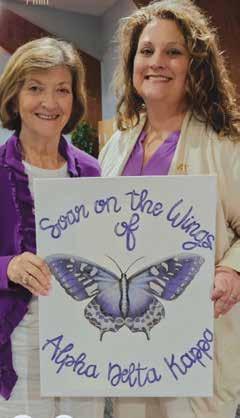
Linda Partridge, with 42 years of membership in A∆K, has dedicated her life to the betterment of education. A retired principal, her influence
extended beyond the classroom, fostering environments where students could thrive. Her leadership skills, honed over decades of experience, are now channeled into her role as president of the Omicron chapter. Omicron chapter flourishes under her guidance with initiatives that support professional development for teachers, scholarships for students and altruism in community outreach programs.
Following her mother’s footsteps, Shannon Lee has been a member for seven years. Using her skills as an elementary classroom teacher, she brings fresh energy and innovative ideas to her chapter. Her chapter is known for its vibrant community involvement, from organizing literacy programs for underprivileged children to spearheading fundraising events for educational resources.
The synergy between Linda and Shannon is palpable. Their shared commitment to Alpha Delta Kappa’s ideals strengthens both chapters, creating a ripple effect of positive change. Their joint efforts highlight the importance of intergenerational collaboration in fostering a supportive network for women educators in Alabama.
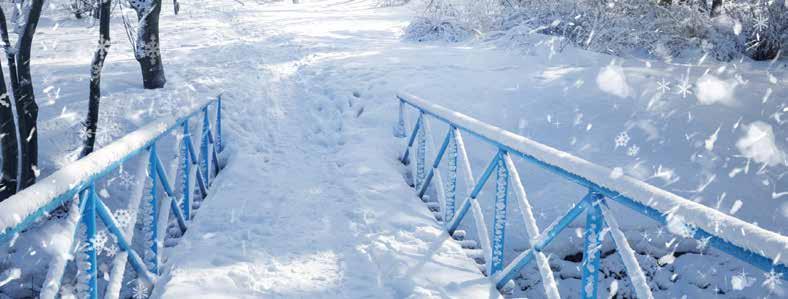
By Bev Keck, TX Delta Epsilon Secretary
Choosing a name for a school is a challenging task. It was this summer in Alvin, TX, when the Alvin Independent School District (ISD) dedicated the Barbara Klinkovsky Bennett Elementary School in honor of TX Delta Epsilon member Barbara Elaine Bennett. With her years of service to the district and the community, Barbara was the perfect choice.
TX Delta Epsilon is honored to introduce Barbara, who exemplifies the core values of A∆K and has made significant contributions as an outstanding educator.
Barbara earned her Bachelor of Arts in May 1975 and completed her Master of Arts at the University of Houston in December 1977. She began her professional journey as a speech and language pathologist with Alvin, TX District in August 1975.

Barbara has strengthened the education profession throughout her career through her unwavering commitment to diversity and inclusion, particularly while working with children with various disabilities. She has consistently shown respect for each student, focusing on enhancing their strengths and abilities.
She has fostered valuable relationships and networking opportunities while serving children of all ages, from three-yearolds to high school students. She continually strives to identify ways to help each student make progress. Her passion for collaboration has led her to consult with other special education colleagues to improve communication skills among students. Barbara has also supported the District’s Autism Evaluation and Early Childhood Assessment Teams.
Even after retiring as the Lead Speech Pathologist for Alvin
ISD, she remains dedicated to her personal and professional development through her involvement with the Texas Speech and Hearing Association and the American Speech and Hearing Association.
Since her initiation in November 1986, Barbara has held various officer positions at the chapter and district levels. Her readiness to serve is well-known; Barbara is the person to ask if something needs to be accomplished. She volunteers tirelessly in her community and is an active member of First Presbyterian Church in Alvin, where she teaches Sunday school, serves as the Education Team Chairperson, and is an ordained elder. Additionally, she supports the community Clothing Outlet hosted by her church and is an essential volunteer for the Alvin ISD Operation Backpack school supply drive. Barbara also mentors students through the Alvin ISD YET program, participates as a Care Reader, and volunteers with the READy program when needed.
Her commitment to lifelong learning and energy are particularly evident in her work with individuals with memory concerns. Barbara volunteers with The Gathering Place, providing respite care for families in Brazoria County. She also contributes to Alvin Socials, the CompU.Talk Zoom School program, and serves as a coach for Early Stage Coaches, affiliated with The Gathering Place.
The elementary school’s dedication recognizes her contributions and pays tribute to her parents, who inspired her to pursue her dreams as an educator.
“Life is like riding a bicycle. To keep your balance, you have to keep moving.”
~ALBERT EINSTEIN
“Continuous improvement is better than delayed imperfection.”
~MARK TWAIN
“Success usually comes to those who are too busy looking for it.”
~HENRY DAVID THOREAU
By Immediate Past Northwest Regional President Helen Foster
Let me introduce you to Vanessa Jackson. She is a member of the Alaska Alpha chapter. She first wandered into a classroom as a substitute teacher in 1995 when she realized she had probably pursued the wrong major. You see, Jackson has a degree as an honest-to-goodness concert pianist, but she went back to school, got her teaching certificate, and taught special education for a couple of years. She left teaching for a while when her husband enlisted in the Army, then was brought back into education by a friend. She had her first band job in 2001 and since then, she’s taught band, orchestra, choir and theater during her 25-year teaching experience.
She served as the music chair for the 2024 NW/SW Joint Conference last summer in Bellevue, Washington. Not only did she lead our excellent choir during the conference, but she also gifted our organization with the most beautiful lyrics to a song she calls “In Alpha Delta Kappa” which the choir sang at the last general session. I don’t think there was a dry eye in the conference room after the choir shared it.
The lyrics are as follows:
Soaring on wings of sisterhood and friendship
Rooted in love, foundations make us strong.
With hands and hearts, let wisdom guide us truly.
Inspire our world as we shall sing our song
No one alone, our friendships strong and lasting
In Alpha Delta Kappa, we belong.So In our hearts, we find bright light is shining.
With excellence in all, we strive today.
What we can give will surely help around us
What we receive will guide us on our way
We care for all, for sisters and for others
In Alpha Delta Kappa here, we’ll stay.
Although we’re diff’rent, we all work together. World understanding always as our guide
Our colors, purple, green, and gold they spotlight
Including all across the world so wide
And through the years, we’ve learned and grown together
In Alpha Delta Kappa, we’ll abide.
Vanessa has this unique ability to write lyrics for music. Her conference lyrics were sung to the original music by Jean Sibelius and the tune “Finlandia.” She wrote the lyrics because she wanted something special for the conference, and she wanted it to reflect what we’ve done as an organization, what we hope to do, and what Alpha Delta Kappa has meant to so many women - and what it could mean to many more in the future. Her lyrics are her gift to Alpha Delta Kappa. She hopes it will be sung by chapters in
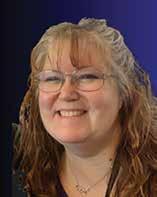
the future and/or at other conferences-that was her intended purpose. She did an interview with Southwest Regional President Mary Ann Englehart and myself and took what we had as our visions for the joint conference; the lyrics are based on these thoughts and visions. The music and a piano accompaniment are in the A∆K All Member Community CONNECT Library.
More about this amazing educator - Vanessa shared, “I excelled at reaching kids that others couldn’t, and I loved working with them. Music is one of the best ways to connect with kids who might not feel valued. Music is also a great way to teach kids who have never struggled before about hard work, and it brings everyone together. I’ve always loved watching the light bulbs turn on and see students do what they didn’t think they could.”
Vanessa left teaching in 2021 for reasons that are still a bit painful; she says, “I’d like to tactfully say I retired early. I moved into the staffing industry, working for a global Fortune 500 company, where I helped people find jobs and excel in their work. When I was laid off due to the downturn in technology, I realized that I genuinely enjoy helping people. So, I took what I learned in staffing and combined it with my teaching experience, and thus, we have ‘Teachers in Transition.’ My business focuses on helping stressed, burned-out, and overwhelmed teachers find peace and leave toxic situations.” Vanessa continues, “Some of them want to find new roles within education, some prefer education-adjacent roles, and others want nothing more to do with the field. I hope to help these teachers remember to put themselves first, like putting on their own oxygen masks before helping others. I work with them on a consulting basis, using my skills to help them transition into other fields. I cover a personal inventory of skills and preferences, résumé writing, LinkedIn optimization, networking, and interview skills. Things are changing very quickly in that world, and the skills teachers have are highly prized by employers, but we just have to figure out how to express them in a way those employers can understand.”
She recently picked up an administrative client with whom she works to help that individual be a leader. This benefits teachers because that is what makes life better for students. Vanessa would love to expand her practice in that area and make education a better place for teachers again.
Currently, she has a podcast called “Teachers in Transition.” To learn more, there is a website called TeachersInTransition.com. Her personal mission is to help as many teachers as possible find the life they want, whether it is in the classroom or not.
Interview by Betty Jo Evers, AZ Iota
Alpha Delta Kappa members are amazing. Our members are educators, authors, volunteers and leaders. They are intelligent, creative, innovative, caring and giving individuals. Our members inspire, energize, encourage and share.
I had the privilege of interviewing one of our amazing members, Suzanne Maly. Maly is a fraternal sister and friend. We first met in 2004 and since then, we have worked on several Alpha Delta Kappa projects, the most exciting being the chartering of the University of Arizona (U of A) Collegiate Club.
May I present Suzanne Maly, AZ Zeta Immediate Past President.
Betty Jo: Hello, Suzanne. Thanks for being here. When did you become a member of Alpha Delta Kappa?
Suzanne: I was invited to join AZ Zeta in 2004 during my last two years of teaching middle school and community college, which was perfect because honestly, I would not have had time prior to that. I was teaching full day and also night classes while raising my three children as a single parent. I was initiated on January 19, 2005.
Betty Jo: What is your educational background?
Suzanne: I have a BA in Mathematics and an MS in Astronomy. I have taught both math and science at the elementary, secondary and community college levels.
Betty Jo: What education certificates do you hold?
Suzanne: I hold Basic Education and Secondary Education Certificates in Arizona and Texas in math and astronomy and a Life Certificate at the Junior College Level in astronomy and science education. I have a life membership in the National Science Teachers Association, National Education Association and the Arizona Teachers Association.
Betty Jo: What are some of your professional, educational and community contributions and awards?
Suzanne: I was a semifinalist for the Teacher in Space Program; National Science Foundation grant recipient; Middle Level Educator of the Year in Southern Arizona; District Superintendent Award for Teaching Excellence, NSTA/Tapestry Grant Recipient and Project Director, Semi-finalist for Arizona Teacher of the Year and Shell Oil Science Teacher Award; Presidential Awardee in Secondary Science in Ariana; NSTA “Making a Difference Award” National Education Award; National Optical Astronomy Observatory Outreach Board Member; Metropolitan Energy Commission Education Award and Arizona Excellencein-Education Recipient.
Betty Jo: What do you do when you are not doing educatorrelated duties?
Suzanne: I still get up every morning at 5-6 a.m. and leave the house as I did when I taught. These days, I head straight for the horse barn owned by a local family. I learned from them about feeding, watering, grooming, shoveling and riding horses.
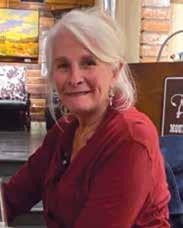
Betty Jo: Share the leadership positions you have held in AZ Zeta as well as on the Arizona State Executive Board.
Suzanne: I have served as the AZ Zeta chapter altruistic chair for two years, treasurer for four years, president-elect for two years, and chapter president for two years. I am now serving as immediate past president for Zeta and sponsor for the U of A Collegiate Club. I also served as the AZ State treasurer from 2013-2018 and on the AZ state budget committee.
Betty Jo: When and why did you become interested in chartering a collegiate club?
Suzanne: After I retired from full-time employment, I continued to teach part-time for Pima Community College in Tucson. Through my leadership positions in Alpha Delta Kappa, I realized the real value of being in an organization like ours is to reach out to teachers who are still in the classroom. I still visit and conduct presentations in classrooms for our Zeta chapter active teachers. I still wonder why Alpha Delta Kappa never had a presence on college campuses as other organizations do although there has been some advantage to keeping the organization with a more educational foundation than a social sorority. As of now, I think we belong at the college level. I think our young people need our direction and encouragement now more than ever before.
Betty Jo: How did you start the collegiate club?
Suzanne: In the fall of 2018, I began meeting with students in my Science Education class at Pima Community College which offers Associate Degrees in Education. The students then move to the University of Arizona to complete their education degree. In the Spring of 2019, I met with the Director of Early Childhood/Elementary Education, Dr. Donna Jurich, and asked CeCe Hall, U of A graduate and Alpha Delta Kappa Past International President, to attend this meeting. Dr. Jurich approved our request to begin a club. She literally said, “Where have you been all this time?” I invited students from my Pima College class to meet, and by the fall of 2019, I had two U of A Faculty, Dr. Donna Jurich and Professor Marla Orozco as advisors. I followed all the steps to begin a club on campus, which began through
the ASUA, Associated Students at the University of Arizona and the Guidelines of Alpha Delta Kappa. In October 2019, some of the recruits attended the Southern District Founders’ Day Celebration. By November 2019, those students recruited 12 more members from their classes and we were ready to charter in February 2020. We had a wonderful chartering ceremony at the College of Education, which was attended by students, their families and members of Alpha Delta Kappa chapters, state and International officers.
Betty Jo: What happened next?
Suzanne: COVID happened next! By April 2020, the University of Arizona began shutting down classes and activities but we managed to have a few in-person meetings prior to shut down. We kept in contact on ZOOM and by email. Things eased up in the fall 2022 and we had a College of Education Club Fair. We were fortunate to initiate freshmen who have been the backbone of the club ever since. President Megan Floyd, Vice President Carley Shotsman, Treasurer and Membership Chair Emma Persson are some of the freshmen who became club leaders. Most of our members will graduate in 2025.
Betty Jo: What is the next chapter for the U of A Collegiate Club?
Suzanne: One of our advisors, Dr. Donna Jurich, has just retired, and our existing advisor, Maria Orozco, will be joined by Chelsea Bruce, a member of the Arizona Psi Chapter. Chelsea works full-time at the University of Arizona. I could have not done any of this without the support of Arizona Psi, Omicron, Sigma and Beta chapters. This fall, we will begin the semester with the Club Fair at the College of Education where we hope to sign up freshmen and sophomore students.
Betty Jo: Good luck with recruiting this fall. Now, share what life will be like for you in 2024-2025.
Suzanne: I will be up to the usual mischief including teacher and student support, horse duties and time with family members as we all age and have to adjust to what our bodies were not meant to do in spite of what we think they can do. I have a daughter who just turned 50, for heaven’s sake, and I still want to act like I am the one who just turned 50. I learn something new every day. I like being around young people. I plan to keep

sponsoring the club as long as I possibly can but I like the idea of getting the local chapters involved with the club. I am grateful for their help and generosity. I think our students appreciate the fact that retired teachers are interested in their careers and futures. Let it be. It is good.
Betty Jo:. Are you aware of what two of the U of A Collegiate Club members had to say about their experiences in the club?
Suzanne: I would be interested to hear it from their perspectives.
Megan: We are the Alpha Delta Kappa Collegiate Club at the University of Arizona in Tucson. I chose to join and stay in this Club because of the tight-knit friendships and community. Our club continues to be a place of support for our members as they navigate the world of education. We have had many different volunteer roles at StepStone Family and Youth Services, World of Words Library at our College of Ed and at the local Z Mansion Soup Kitchen. At the same time, we are students in a professional program in the College of Education. We complete fieldwork hours in the Tucson schools, spend time with our cohorts, and always strive to participate in educational excellence. Megan Floyd, President (Senior)
Carley: Joining the academic club my freshmen year truly gave me a support system within the education world. I have gained important insight from many Alpha Delta Kappa sisters as well as opportunities for community service and social events. I had the opportunity to gain new skills as secretary and vice president of our club. I am grateful for the friendships and support which will help my future as an educator. Carley Shotsman, Vice President
Betty Jo: Suzanne, these young ladies will forever be your friends and vice versa. You are absolutely “paying it forward.” Thank you. One last thing: I know you are a co-author of two professional documents. Please share those titles.
Suzanne: I am happy to do that. I co-authored/published a student guide: “Visitors from Space-Comets!” NSF, NOAO, 1997 In 2001, I co-authored/published an astronomy book: “Our Galaxy and the Universe.”
Betty Jo: Suzanne, thanks for this interview. You are definitely one of our Amazing Alpha Delta Kappa members.

Congratulations to the chapters celebrating anniversary milestones.
10 Years
North Carolina Delta Epsilon
20 Years
Maryland Alpha Alpha
Virginia Gamma Kappa
30 Years
North Carolina Gamma Tau
Puerto Rico Alpha Epsilon
Virginia Beta Chi
West Virginia Beta Beta
40 Years
Alabama Beta Upsilon
Florida Fidelis Kappa
Manitoba Delta
North Carolina Fidelis Kappa
Nebraska Alpha Iota
South Carolina Alpha Phi
South Carolina Alpha Chi
Texas Epsilon Lambda
Virginia Alpha Tau
50 Years
Arizona Alpha Lambda
Illinois Beta Mu
Louisiana Alpha Chi
Louisiana Alpha Psi
Louisiana Beta Alpha
Michigan Gamma Zeta
Nebraska Upsilon
Nebraska Phi
Nebraska Chi
New Jersey Phi
New Jersey Chi
New Jersey Psi
Tennessee Beta Zeta
Texas Delta Xi
West Virginia Alpha Sigma
60 Years
Arizona Sigma
California Beta Iota
California Beta Kappa
Florida Beta Rho
Florida Beta Sigma
Indiana Sigma
Indiana Tau
Maryland Nu
Michigan Beta Alpha
Michigan Beta Gamma
Michigan Beta Zeta
Minnesota Chi
Montana Theta
North Carolina Alpha Sigma
North Carolina Alpha Upsilon
North Carolina Alpha Phi
New Jersey Epsilon
Rhode Island Alpha
Rhode Island Sustaining
South Carolina Omicron
Tennessee Alpha Kappa
Tennessee Alpha Lambda
Texas Beta Pi
Washington Alpha Nu
West Virginia Alpha Beta
Alabama Gamma
Connecticut Alpha
Connecticut Sustaining
Delaware Alpha
Delaware Sustaining
Georgia Beta
Iowa Epsilon
Idaho Sustaining
Illinois Alpha Delta
Kentucky Sustaining
Louisiana Eta
Maryland Alpha
Maryland Beta
Maryland Sustaining
Michigan Alpha
Michigan Gamma
Michigan Delta
Michigan Sustaining
North Carolina Beta
North Carolina Gamma
Ohio Alpha
Ohio Sustaining
Tennessee Alpha
Tennessee Beta
Tennessee Gamma
Tennessee Sustaining
Texas Theta
Washington Epsilon
Here's to You!
Happy Anniversary to the new Platinum and Golden Sisters. The KAPPAN congratulates you on your milestone achievement.
70 years a member
Imogene G. Hogan California Sustaining
Malissa Baum Florida Theta
Florence Renton Florida Theta
60 years of membership
Annette Daugherty ................................ Alabama Alpha
Doris P. Beatty ................................ Alabama Alpha Iota
Peggy L. Norris ............................... Alabama Sustaining
Marilyn E. Cain California Beta Eta
Lee W. Suddath Florida Alpha Lambda
Cecelia B. McKinney ....................... Florida Beta Sigma
Maria L. Garcia................................. Florida Sustaining
Gloria S. Householder ...................... Georgia Alpha Phi
Hazel B. Stanton Georgia Lambda
Lois J. Wright Georgia Sustaining
Roneith Anderson Illinois Sustaining
Barbara K. Braun ........................Kentucky Alpha Theta
Sharon R. Cook ....................................... Maryland Eta
Barbara A. Stuart Michigan Alpha Kappa
Edna G. Rottiers Michigan Alpha Kappa
Marlene Barr Michigan Beta Zeta
Charlotte K. Davis ................................. Minnesota Chi
Marlys L. Ostby ..................................... Minnesota Chi
Esther E. Pfeifer Minnesota Chi
Jane Wolfram Minnesota Chi
Phyllis Jobe Missouri Gamma
Peggy D. Derrington ...................... Missouri Sustaining
Margaret E. Baird ...................................... Ohio Kappa
Andrea Roe Ohio Kappa
Elfrige Nikkel Oklahoma Epsilon
Norma E. Blythe Rhode Island Sustaining
Joan E. Strong ...................... South Carolina Alpha Beta
Betty W. McMichael ............. South Carolina Alpha Tau
Sue Stone Tennessee Chi
Patricia W. Simmons Tennessee Eta
Cornelia Berkemeyer Tennessee Lambda
Andretta G. Lowry.........................................Texas Beta
Betty Minzenmayer ............................... Texas Omicron
Barbara S. Dyer................................ Virginia Sustaining
Gloria A. Steberl Washington Alpha Upsilon
Betty L. Ellis West Virginia Alpha Beta

“Around the world, members combine their energies and talents to enrich their lives and the lives of others through thousands of heart-warming community based altruistic projects. Because of these projects, it is a brighter day…” ~Alpha Delta Kappa Handbook

The temperature may drop, but that doesn’t stop the AK Zeta sisters from building bridges to their community. In December, through Helping Alaska, they adopt a family and shop for suggested gifts. The chapter’s January project is hand-tied fleece blankets and stuffed animals to be given to children at Stevie’s Place, a child advocacy center. Volunteering at the Fairbanks Food Bank is also on the January agenda. Then, in February, they make and send valentines to retired teachers at Pioneer Home, an elder care facility. The sisters also support the Lathrop High School Ballroom Dance Team’s performances.
Bundled up and cheerily displaying the donations for Stevie’s Place are (L to R) Kathy Doyel, Amanda Ross, Judy Shiffler, Robyn Atkins and Teresa Hall.

WV Delta sisters (L to R) Wynne Proudfoot and Kathy Green display 50 books collected at a recent chapter meeting. The books for children and adults will be donated to the 11 Free Little Libraries of Taylor County, WV and will help support literacy growth in Taylor County. Over the past two years, the chapter has collected over 700 books to support this altruistic project.

CA Gamma Mu sisters gathered at Crystal Cove Beach to make “Welcome Home” cards for
the Marines returning to Camp Pendleton, CA, after their latest deployment. Chapter sisters have supported our troops for many years, dating back to when they were serving in Afghanistan. When the Marines arrive from their previous duty stations, they often lack basic toiletry supplies and towels. Gamma Mu members assist them by helping to provide these supplies as well as handmade cards welcoming them and thanking them for their service.
Gamma Mu sisters pictured are (L to R) Mari Page, Past California State President Karen Kirby, Pat Renga, Caryl Stein and Diane Poettgen.
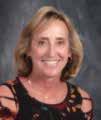
Julia Gates, past president of AZ Psi, who teaches first grade at a Title 1 elementary school in Tucson, AZ, was recently interviewed by Tucson’s Channel KGUN 9 regarding their matching funds for books partnership with the non-profit Scripps Howard Fund’s “If You Give a Child a Book.” Julia spoke of the desperate need of her students and her school. Each child receives between six and eight new books from the partnership. She said it is essential to put books in students’ hands, especially in first grade where, as she puts it, “It’s just the critical year when reading needs to come together.” But, for many families, “books take a back seat to essentials.” She pointed out that this issue has been tough. “Since COVID, and now with the economy, books, unfortunately, are not on the priority list.”

During Childhood Cancer Awareness Month, VA Theta heard a presentation from Juanita Prada, founder of BeholdBeGold. This organization raises awareness and supports childhood cancer survivors facing the late effects of treatment. Prada, who had cancer as a child, has survived cancer twice. Her organization, she says, “is a platform which enables survivors to connect, thrive and share their experiences. The focus is on education, policy efforts, community partnerships, resource referrals, peer support, research funding and awareness campaigns.” Theta sisters contributed toys for the Carilion Children’s Center in Roanoke, VA. Juanita Prada stands between Theta Co-Presidents (L) Shelia Balderson and (R) Mary Jo Fassie.
“As a long-time advocate for her students and reading, Julia’s interview helped spread the word. Psi chapter is proud to share her passion and be a part of her success in getting books into the hands of her students and school, as many members have donated over the years to this worthy cause,” said AZ Psi President Ann Fullerton.
Julia is a past recipient of Arizona’s Excellence in Education award. She is currently Arizona’s corresponding secretary and has served as Arizona sergeant-at-arms.
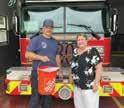
FL Alpha Alpha sisters have been busy building bridges across their community with their donations. Members visited the A∆K house at Florida State University, presenting gift cards to use for the recent kitchen renovations. They also honored first responders in their area with buckets of snacks. At the Gulf Regional Conference, the sisters conducted a workshop on meditation.
Rachel Van Epps presents a bucket of snacks to a firefighter.

AL Lambda members celebrated Founders’ Day by donating to Steel Magnolias for Breast Cancer Awareness Month in honor of Lambda Honorary Member Marti Warren, a breast cancer survivor.
Pictured Lambda members (L to R) June Land Reaves, Martha Gray, Ellen Harner, Lisa Mulvaney, Cheryl Cotton, Becky Henderson, Karen Crockett, Carolyn Whitley, Christie Gaither and Jane Lipham.
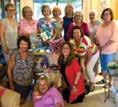
MD Beta members raised money for St. Jude Children’s Research Hospital by painting Fall Porch Leaners. For a $20 donation and the cost of supplies, eight sisters took part in the activity created by Beta President Mary Yeates. Mary acquired her art skills using a regional mini scholarship to take an online art tutorial. She is now giving back by sharing her skills with her sisters while raising funds simultaneously. Another fall chapter activity was collecting toys for the Pediatric Unit at Walter Reed National Military Medical Center.
Members showing some of the toys collected are (L to R top row) Terry Melo, Kay Caviness, Janet Burton, Ginny Singhaus, Joy Camp, Trina Rabovsky, Ellen Roderick and Amy Johnson. (L to R bottom row) Mary Yeates, Judy Jaskolski, Beth Kauffman and Annie Kozma.

TX Gamma Nu enjoys serving an annual meal for Journey of Hope, a no-fee support group for children and families experiencing grief after a death,” said Past President TX Gamma Nu Kathy Matthews. “Each year, we bring a hot meal with a salad to serve to all the families attending that evening’s support group.”
IL Beta Epsilon members Rita Vanderby and Sharon Morris display some of the over $400 in school supplies the chapter donated to a local school. The donations are an annual altruistic project of the chapter.

GA Alpha Sigma members wrote cards of congratulations and gave gift cards to the 35 Douglas County Teachers of the Year. Along with the card came an invitation to a reception in their honor. Alpha Sigma recently donated over $1,200 and food to The Gift of Love, one of the chapter’s altruistic projects. The Gift of Love, a local nonprofit, serves elementary and middle schools in Douglas County, GA, providing bags of food for weekend and holiday meals for over 300 children.
IL Beta Pi sisters show their new A∆K Beta Pi tote bags filled with goodies to start the new year. The sisters also made donations to the Lake County Farm Bureau. Pictured (L to R)
Cindy Smith, Ann Roberts, Polly Mazmanian, Barb DiPierro, Carol Schwab, Lydia Crawford, Nikki Tsimogiannis, Jennifer Sparkman, Judy Hatke, Pat Vukovich, Peggy Petropoulos-Kiriazis, Bridgette Otterbacher, Eva Korellis, Mary MilnarStephens.

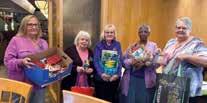
MI Beta Mu sisters believe that school begins with great supplies. In September and February, they collect school supplies and donate them to Turning Point, a women’s shelter. Displaying some of their donations are (L to R) Susan Troxell, Janet Alaska, Joanne Benham, Vicki WhitsettJackson, and Ann Mucha. According to Chapter Co-President Rose Claus, Beta Mu participates in many altruistic activities throughout the year.
NJ Epsilon sisters wrote notes of encouragement for strength for their active sisters returning to begin the new school year. They placed them in reusable cups filled with candy and tea bags. Showing the cups (L to R) are Raffaela Yurecko, Leslie Ragucci and Josie Florio.


For the tenth year, sisters from OH Lambda chapter participated in the Tom Fennessy/Mike Hardin “Back to School Project.” This year, Lambda sisters filled 1900 Kindergarten backpacks. These will be distributed to agencies and school districts throughout central Ohio for children in need. Participating sisters (L to R) were: Ellen Frasca, Jill McGary, Theresa Nixon, Mary Ann Grossman, Ann Fowble, Pat Fehribach, Georgine Collette, Lillian Smith, Debi Matthews, Heather Snyder, Kelley Dunn and Mary Ey.

Collecting and donating clothing for emergency clothing changes in the six elementary schools in their area is the annual project of MN Pi. This year, the sisters also collected over $150 for clothing purchases. Along with the socks, underwear, pants and tops, the sisters delivered information about their chapter and A∆K to the main office of the schools. Shown with some of the donations are (L to R) Kathy Gere, Diane Grigal, Estelle Winiecki, Elaine Hanson, Terry Briggs, Kathryn Johnson, Adele Nally, Joan MacDonald, Judy Jacobsen, Debbie Raymond, Phyllis Haglund, (kneeling) Chris Manka. Photo credit: Liz Parr-Smestad.

NC Beta Omicron sisters and guests assembled “Surprise Bags of Encouragement” for over 20 middle school special needs students in their area. The participants wrote personalized letters to individual students, emphasizing the student’s area needing encouragement. The letters were added to gaily decorated bags filled with school supplies. The sisters showing the joy and fun of sharing creative ideas while working together are Front Row (L to R) Kaye Ruth, Charlotte West, Margie Black, Phyllis Williams, Evelyn Chevalier, Bettie Martin, Ruth Dealy. Back Row (L to R) Billie Daugherty, Camille Hedrick, Patty Byrne, Karen Brown, Christine Roberts, Paige Hutto, Debbie Maness, Eleanor Miles
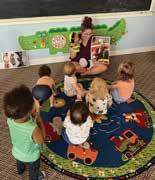
Retirement is so uplifting—that is until you look at all the boxes of teaching materials you accumulated during your teaching career, which now line the walls of your garage. Does this sound familiar to anyone? Recently, a CO Alpha Tau sister had this problem, only for her, the milk crates of books lined her guest room walls.
However, this creative sister found a solution that solved two problems. The Montana Dream Center was opening in Billings, MT. The Little Dreamers Early Learning Center is based in the Montana Dream Center. The learning center was in desperate need of books and learning materials. Brenda Ledeboer, an Alpha Tau sister, heard about this need from a friend who was volunteering at the center. Brenda packed 349 story books, multiple learning center toys, and a box of community helper books, posters, and puppets. They were delivered to the Montana Dream Center the weekend before it officially opened.
As the materials were carried into the building, teachers claimed them for their rooms even before the boxes were unpacked. The Little Dreamers Early Learning Center sent photos of opening day, and Brenda was thrilled beyond words to see that her puppets were being used on the very first day of class.
The majority of the children in Little Dreamers Early Learning Center are from foster homes or are in economically challenged situations. The students and teachers are enjoying the classroom materials, and Brenda is thrilled to have bare walls in her guest room. Even more, her heart is warmed, knowing the children are smiling while using the teaching materials that were just taking up space in her garage and guest room.
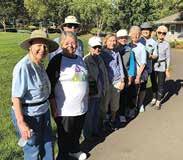
Members of MN Alpha Alpha and husbands (L to R) Linda Siluk, Len Copt, Sharon Copt, Bruce Robb, Janet Robb, Karol Bowman, Joyce Nelson, Carrie Roban, and Mary Abuan get ready to walk in Roseville’s Central Park to raise funds for St. Jude Children’s Research Hospital. The chapter raised $1,300. Before the walk, the group visited the floral displays at the Central Park Arboretum.
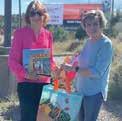
In June, the city of Ruidoso, New Mexico was devastated by fires that burned over 500 homes. When school started in August, one of the teachers in Ruidoso gave an assignment to her students to read for 20 minutes at home. One of the students raised her hand and said, “All my books burned.” Immediately the sisters of New Mexico Eta responded by gathering books to be distributed to students who had lost their homes. Eta chapter sisters all live in Lincoln County, NM which includes Ruidoso. When Arizona Chapters Zeta and Psi heard of this need, they joined in the collection of books for students in Ruidoso.
Pictured above are New Mexico Eta President Rosemary Shafer accepting books from Arizona Zeta President-Elect Brenda McDowell.
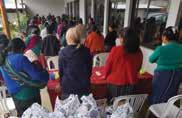
I’m sure that most of you would agree that it is wonderful to be part of an Alpha Delta Kappa chapter. Where else could you find so many caring sisters who can be counted on to respond generously when they hear about a need they could meet?
In July, I was on my way to Sumpango in Guatemala. I went there as part of a team of four to serve alongside my friends who run a ministry called PILAS Student Ministry. With their staff, they provide learning support and leadership training to schoolaged children, youth and young adults in the town and surrounding indigenous villages. As part of the students’ leadership training, they provide opportunities to serve the marginalized in their community.
When I was asked if I could bring warm sweaters in sizes small and medium for some elderly women and single moms, I knew within a heartbeat who I could count on to meet that need. My Ontario Sigma sisters mobilized right away to provide two suitcases full of sweaters in various colors and styles. In addition, they surprised me by making a monetary donation, which was used to contribute to a bag of grocery staples for each woman who attended the event where the sweaters were distributed. What a blessing my sisters’ generosity provided! It was received with warm hugs and smiles from the recipients. It was very special to be there to see how our simple act of kindness impacted the lives of other women many miles away.
Altruism doesn’t have to be complicated. Like this, it can be simply a heartfelt response of support that meets a need that has been expressed.
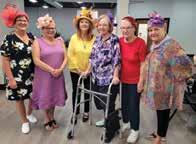
NY Alpha sisters celebrated the chapter’s 70th anniversary with a tea party and an altruistic collection for “Hands for Healing Heroes,” a group that addresses the needs of veterans who experience long waits for treatments. The sisters contributed over $500 to the group. NY Alpha President Mary Ann Kramer said the project’s selection was appropriate because it was made on the anniversary of 9/11. The chapter used its “Educators are Heroes” grant to welcome prospective members.
In their tea party finery are (L to R) President Mary Ann Kramer, Liz Lia, Trish Blanchard, Lindalee Menchetti, Mary Marcinkowski and Chris Bialik
Actively supporting the 150 newly appointed teachers in Florida’s Leon County Schools is one of the altruistic projects for FL Alpha Sigma members this biennium.
Five members shared encouragement and information about Alpha Delta Kappa to 67 beginning teachers at a “New Teachers Boot Camp” in July. Each new teacher was given a goodie bag filled with candy and an acrostic poem of encouragement.
After hearing a presentation by the district’s Early Career Coordinator Jessica Titze describing the school district’s support system for new teachers, the sisters decided to make support for new teachers the focus of the chapter’s focus for Alpha Delta Kappa month. Jessica gave suggestions for ways to provide support. During the month, members collected and distributed supplies to over 40 schools where the new teachers were assigned. Members also donated over $400 to purchase 20 gift cards given as door prizes during an October support meeting.
One member wrote notes of encouragement to each new teacher, and some members offered to answer questions and address the concerns of the new teachers.
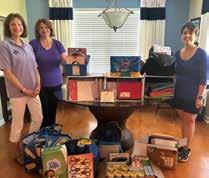
“Through these efforts, Alpha Sigma aims to ensure that new teachers feel valued, supported and prepared to embark on their teaching journeys. Alpha Sigma is making strides in creating a supportive and welcoming environment for new teachers in the Leon County Schools,” said Alpha Sigma President Claudette McCann.
Pictured are Alpha Sigma sisters with supplies they collected.
CA Beta sisters celebrated the chapter’s 70th anniversary and the ninety-ninth birthday of Dorothy Vaio, one of the chapter’s founders. Beta was chartered in San Francisco in August 1953. Dorothy, a Platinum Sister, was elected state vicepresident and recording secretary at the first California State Convention held in Berkeley in 1956. Ten years later, she was elected California state president. Dorothy, according to chapter members, has provided leadership, guidance, support and advice over the years, not only to Beta sisters, but also to all San Francisco sisters. Celebrating the two important events are front row (L to R) Madeleine McCormick, a member of CA Alpha Xi, Dorothy Vaio, Myrna Tsukamoto. Second row (L to R) Past Southwest Regional President Mary Ann Englehart and Beta members Helen Soo Hoo, Kathy Gallardo, Diane Golton, Mary Ellen Davis and Susie Scurich.
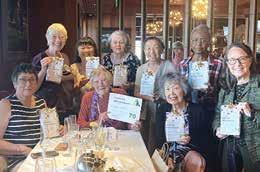
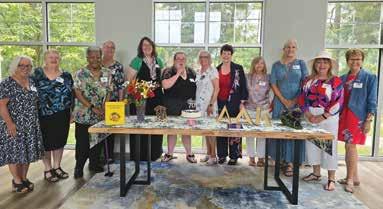
VA Alpha sisters and sisters from across Virginia gathered at The Cove of Francis Asbury United Methodist Church in Virginia Beach to celebrate the chapter’s Platinum Anniversary -70 Years of Stories. Lunch, followed by a PowerPoint program highlighting major events in Alpha’s history, was enjoyed by those attending. The chapter has donated to the Lasagna Love ministry, a church project. On August 23, 1954, at the Monticello Hotel in Norfolk, Agnes Shipman and Pauline Martin initiated 15 members into the newly chartered chapter.
Celebrating the anniversary of their chapter are (L to R): Debbie Query, Marcy Royal, Cheryll Martin, Chris Wallace, Tiffany Carr, Mary Sensabaugh, Linda Warren, Ann Mattos, Diane Gibson, Charlotte Glaeser, Holly Morgan-Anderson, Sue Havice.



Missouri is home to the oldest A∆K chapters, MO Gamma and MO Epsilon. Both chapters were chartered in October 1949. Gamma chapter’s anniversary is one day before Epsilon’s. The two chapters were recognized at the first fall meeting of the state board led by MO State President Carrie Mettendorf.
Pictured are MO State Board officers Front Row: (L to R) Vice President for Membership Ruth Ann Clark, Immediate Past President and Treasurer Dee Elder, State President Carrie Mettendorf, President-Elect Lynn Blosser, Sergeantat-Arms Janie Gray. Back Row(L to R): Corresponding Secretary Susan Nichols, DEI Chair Becki Uccello, Sustaining Membership Chair Susan Richmond, Auditing Chair Mary Beatty, Courtesy Chair Rosemary Comisky, Recording Secretary Andrea Eppenauer, Bylaws Chair Amy Holliday, A∆K Month Chair Jo Ann Reagan.
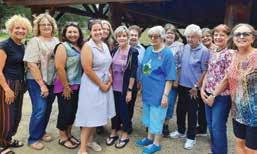
NM Eta sisters and their guests welcomed a new year of chapter activities with a picnic in Ruidoso, NM, and introduced two new members. The chapter awarded $500 scholarships to two area college freshmen. Enjoying the annual event are Chapter Immediate Past President Sarah Ball, Tammy Faulk, new members Cleo Mow and Shelly Elfelt, Coda Omness, Brenda McDowell visiting from Arizona, Chapter President Ruby Dulin, NM Immediate Past President Roxie Moore, Connie Forrest, Darla Lathan, Gail Brinson and Carolyn Redden.


Each August, the week before the fair in Barnum, MN, the Little Red Schoolhouse at the Carlton County Fairgrounds is cleaned inside by members of MN Psi and Carlton County Retired Educators (CCRE). Working together again this year, the two organizations gave out school supplies and books to students. Notebooks, pencils, pens, and crayons were given to students courtesy of donations from area businesses, organizations and individuals. Psi member Jennie Hanson spearheaded the donations drive, which was done through her newspaper column and a very successful letter campaign.
“Visiting the Schoolhouse, built in 1925, is a return to an earlier time in education when chalkboards preceded Chromebooks, desks had inkwells, and the only heat was provided by a black pot-bellied stove. Schoolhouse guests are always thankful for the opportunity to go back in time, and the members of the Psi chapter are happy to provide that opportunity each August at the fair,” said Psi President Shirley Stebbins.
“For some, it is a place of nostalgia as they talk about how they attended a one-room schoolhouse. For the younger crowd, it is the novelty of it, as they find a desk that will fit them and sit down to write and draw on the slates on the desks in front of them, sometimes using chalkboard erasers to wipe them off again.
Visitors find it fun and educational as they read the requirements for a teacher in 1917 or look at the map of all the one-room schoolhouses that were once used in Carlton County. Many of the volunteers answering questions from the visitors are members of Psi,” Stebbins added.
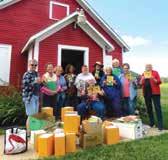
Members of MN Psi in front of the Little Red Schoolhouse show the school supplies given out at the fair. (L to R) Eleanor Eskuri, Lindsay Lally, Mary Wiegand, Jill Juntunen, Mary Svensgaard, Jennie Hanson (seated), Karen Johnson, MN State President Claudia Mescher, Sandy Ferguson, Mary Sanders, Mary Lindgren.
MO Beta Xi sisters relax after their successful community garage sale. The $300 profit will be added to the chapter’s 2025 scholarship fund.
The sisters pictured are (L to R) Front row: Gloria Ventura, Karen Cannon. (L to R) Back Row: Tammy Rhomberg, Shelley Smith, Beverly Meyers, Barb Anderson.
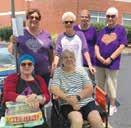

VA Delta sisters and teachers from other countries teaching in schools in Delta’s area, recently shared an evening of “Welcome Outreach.” The international teachers were invited to bring special mementos of their culture and give their first impressions of teaching in an American classroom. A∆K International President-Elect Conway Blankenship addressed the group. Pocahontas District President Barbara Havens and Pocahontas District PresidentElect Kathy Rector were also present. Chesterfield County Public School guests included Amy Bartilotti, Chesterfield County Public Schools (CCPS) Office of Family & Community Engagement; Tito Luna, CCPS Recruiter Human Resource/Talent who helped coordinate the international partnership; and Greg Beacham, CCPS Community Specialist. International teachers and their students are shown displaying the flags of their countries.
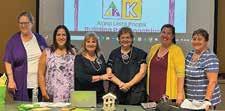
IL Beta Pi chapter celebrated its members in the new Pearl membership longevity category at a recent meeting. Flaunting their strands of pearls are (L to R) eight-year member Mary M. Stephens, two-year member Nikki Tsimogiannis, six-year member Eva Korellis, two-year member Peggy Kiriazis, nine-month member Jennifer Sparkman and three-year member Pat Vukovich.

The sisters of PA Delta proudly show the violet rainbow bracelets they received in celebration of the chapter’s sixty-fifth anniversary. Established in 1959, the chapter has 27 active members. The bracelets in the chapter’s colors were designed and made by the granddaughter of Chapter Co-President Sue Masley. Front Row: (L to R) Kathy Boranko, Ellen Hayduk, Mary Ann Zieger, Helen Mellott, Linda Cecela. Second Row: (L to R) Jenny Marchionda, Bonnie Brady, Karen Petruny, Rosemary Darroch, Betty Doerr, Carol Talbot, Sue Masley, Nancy Galasso, Karen Chewning, Linda Ermi, Pat Gonzalez, Carleen Dinello, Kathy Baldauf, Karen Morris.
Heather P. Minton ..................................... Alabama Alpha Delta
Paula W. Owen ...................................................... Alabama Chi
Mary K. Steedley
Beth Williams
Marjorie A. Anderson
Alabama Chi
Alabama Gamma
Arizona Mu
Gloria Burke ............................................................ Arizona Psi
Frances L. Gilliland ............................................ Arkansas Delta
Kay A. Lijewski
Mary J. Morgan
Barbara B. Rebolt
Jane Burner
Victoria C. Barrows ........................................Michigan Beta Mu
Marlene M. Britton .......................................Michigan Beta Zeta
Judith L. Parsons Michigan Pi
Sharon Wood Minnesota Alpha Alpha
Cheryl L. Breitbach
Arkansas Sustaining
California Beta Alpha
California Delta
Colorado Alpha Gamma
Janice M. June .................................... Colorado Alpha Lambda
Carolyn F. Gardner ................................................ Colorado Eta
Betty L. Legrande
Peggy Jesson
Wilma Kermiet
Colorado Sustaining
Colorado Sustaining
Colorado Sustaining
Vivian H. Bowden ............................................ Florida Alpha Nu
Frances S. Godfrey McClelland........................... Florida Epsilon
Peggy N. Hagerman
Jacqueline F. Ouellette
Patty J. Swann
Florida Fidelis Rho
Florida Gamma Beta
Florida Gamma Gamma
Delaine C. Furst ................................................
Florida Omicron
Grace F. Pigeon .................................................... Florida Theta
Julia A. Kidd
Janice K. Mock
Elizabeth Ware
Georgia Alpha Alpha
Georgia Alpha Alpha
Georgia Alpha Gamma
Patricia B. Mosley .................................... Georgia Beta Gamma
Sacra N. Vaughan.................................... Georgia Beta Gamma
Allawee C. Gaggstatter
Mildred W. Hunter
Sylvia Rowland
Georgia Beta Rho
Georgia Beta Theta
Georgia Fidelis Lambda
Joan L. Jachino ................................... Georgia Gamma Epsilon
Nora L. Meyer................................................... Illinois Alpha Nu
Jane A. Alderson
Biddi R. Parry
Evangelina Vilegas
Illinois Psi
Indiana Tau
International Sustaining
Audrey E. Evans .................................... International Sustaining
Rosalynn S. Carter ................................ International Sustaining
Loryl J. Cole
Carolyn A. Erts
Joan Smith
Iowa Kappa
Iowa Sigma
Jamaica Beta
Susan Lepisto ........................................... Kentucky Alpha Rho
Lora D. Bradley .................................................... Kentucky Tau
Katherine T. Croft
Miriam B. Dyer
Sonja L. Davis
Louisiana Alpha Xi
Maryland Omicron
Maryland Sigma
Minnesota Alpha Phi
Mary L. Carlson ................................................... Minnesota Psi
Judith J. Martin ................................... Mississippi Alpha Epsilon
Vicki A. Vaughn Mississippi Alpha Theta
Alice J. Jenson Nebraska Lambda
Linda K. Petersen Nebraska Sigma
Janet L. Corriveau New Hampshire Eta
Patricia A. Hathaway .................................. New Hampshire Mu
Hazel J. Putz ..................................................... New York Delta
Doris S. Reynolds New York Mu
Evanna M. Sullivan New York Nu
Barbara H. Clark New York Sustaining
Dorothy I. Green ...............................North Carolina Alpha Delta
Becky P. Meyst ........................................... North Carolina Beta
Barbara B. Creech North Carolina Gamma Lambda
Margaret F. Brake North Carolina Gamma Tau
Betty C. Hicks North Carolina Rho
Kitty S. Wynnberry ............................. North Carolina Sustaining
Margaret S. Joyce ............................. North Carolina Sustaining
Irene Betty Miller Ohio Alpha Gamma
Jeri J. Mackley Oregon Alpha
Becky Dingle South Carolina Alpha Tau
Nannie M. Pratt ............................. South Carolina Fidelis Alpha
Betty R. Miller ....................................... Tennessee Fidelis Theta
Mary E. Kiser Tennessee Theta
Mary A. Zager Texas Beta Lambda
Carolyn Hunt Texas Beta Pi
Mary L. Casseb ....................................................Texas Epsilon
Donna Britt .............................................. Texas Epsilon Upsilon
Betty J. Kitchens Texas Fidelis Theta LAPSED
Bonita M. Moore Texas Gamma Tau
Neva Barker Texas Sustaining
Earline Andrews ............................................... Texas Sustaining
Elaine Deering ................................................. Texas Sustaining
Diane B. Harris Virginia Delta
Barbara W. Jessup Virginia Mu
Donna E. Pauly Virginia Sustaining
P. Buckley Moss ........................................... Virginia Sustaining
Wileina F. Furrow ............................................... Virginia Upsilon
Nancy Evans Washington Alpha Delta
Nancy P. Atkinson West Virginia Beta
Thelma Dunnum Wisconsin Zeta

While teaching a second-grade reading small group, a little boy turned and said so sweetly, “I’m glad you wore makeup today.” Confused, I replied, “I wear makeup every day!”
Gotta love ‘em!
Melissa Hoffman, GA Alpha Epsilon
I was teaching fifth grade and needed to leave the room for just a few minutes. I told my class to keep working and that I’d be back to answer questions in two minutes. I walked out the door and three students followed me, asking their questions. Partway down the hall on my way to the restroom I turned around and heard, “Mrs. Copt...” I stopped and told them, “I’ll be right back, but I need to use the restroom.”

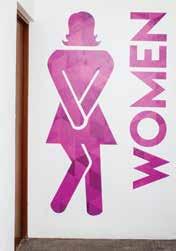
All three had surprised looks on their little faces that I’d acknowledged I was human just like them.
Sharon Copt, MN Alpha Alpha

When I taught in a Special Education, self-contained classroom, we took the students to an Arts Fair at one of our local colleges. One year, a magician showed our students magic tricks. After many “oohs” and “ahhs,” he asked the students, “Who was the greatest magician of all time?” He hoped someone would say, Houdini. However, one of my students answered, “God.” The magician was surprised but answered, “Well, yes, but besides Him.” We all got a chuckle from the answer.
Bonnie Sullivan, WA Alpha Nu
I was teaching 6th-grade students, and the school district had a forestry field trip planned for a science lesson. We had everything prepared for the students, including sack lunches and water. I had asked the children not to pick up any animals and to assume all snakes were poisonous. All went well until we had our bathroom break. Porta-potties had been brought to the location for the field trip. The students were in line for the restroom. As I monitored them, one student went in, and after a few minutes, I heard him yell my name. I answered, “What do you need?” He asked, “How do I flush the toilet in here?”
Leslie Koenck, LA Alpha Sigma

While teaching first grade, I received a note one morning from a disgruntled parent. It read something like this: “How dare you not let Susie have lunch today! She was so upset that she was unable to have lunch.” After thinking for a few minutes, I realized what the problem was. The cafeteria had served “breakfast for lunch” the day before, so when the mother asked what she had had for lunch, Susie replied, “I only had breakfast.” The mother was embarrassed when the situation was explained. We had a good laugh.
Elaine Johnson, GA Fidelis Lambda
December 25-31 .................................. HQ closed for Winter Break
Jan 1 ................. International Dues and Chapter ITE contributions deadline to HQ
Jan 1 ............................................................................... HQ Closed
KAPPAN submissions deadline (March publication)
Jan 20 .......................... HQ Closed for Martin Luther King Jr. Day
Jan 25 ....... International Teacher Education (ITE) Virtual Webinar
Jan 31 ................... Regional Professional Development Scholarship Application deadline
Dues submitted online or postmarked after January 31 will incur $5 per member late fee
Feb 1 ... Update S/P/N Excellence in Education Chair in the S/P/N Officer Roster located in the directory
Feb 15 .........................Agnes Robertson Global Outreach (ARGO) Scholarship application deadline Fine Arts Grants Applications deadline
Feb 17 Headquarters Closed for Presidents Day
March 1 ........... Future Educator Scholarship Applications deadline (for A∆KCC Students only)
March 1 ......................... Making a Better World Initiative deadline Legacy Scholarship Applications deadline
Member suspension for delinquent dues if dues not received at HQ by March 1
March 15 .......................... Volunteer Applications for International Committees and Boards deadline
Chapter Bylaws or Policies & Procedures Official Statement to S/P/N Bylaws Chair deadline
Kaleo Hanohano of HI Zeta was recently awarded the Hawai’i State Teachers Association 2024 Pono Award (pono Hawaiian for righteous and true) for inspiring social justice advocacy. She was honored for building connections - the kuleana of our youth with the community (kuleana referring to the Hawaiian ideal that each of us has both the responsibility and privilege to care for and protect the land and the community to which we belong).
Kaleo has taught for 32 years In Hawai’i at Kahuku High School and Intermediate. As a Hawaiian language and history teacher, she has worked to ensure that education perpetuates indigenous place-based learning and promotes sustainable practice. Her efforts and impact prompted the Hawai’i State Teachers Association to present her with the Pono Award, which recognizes an exceptional HSTA member who advocates for social justice issues that impact the lives of students, fellow educators and the community. Her advocacy and teaching ensure that Hawai’i youth can embrace and demonstrate this kuleana for generations to come.
The award recognizes that, in her attempts to re-envision the Hawaiian language program as a thriving academy, she
was able, with grants from the Hawai’i State Department of Education’s Office of Hawaiian Education, to develop classroom norms and language competencies while scaffolding with an āina (land)-based focus by connecting with community partners and local farmers to teach land resource sustainability for our survival.
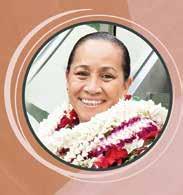
When receiving her award, Kaleo shared the advice her grandmother and noted educator Hazel Akepamaikalani Akim Naone gave her when she began her teaching career: “Make friends by connecting with people in your school. Get to know your community. Share your talents.” In Kaleo’s acceptance speech, she also shared her own inspirational words: “Together, we have power. Create a situation where you can return to the work and ask how you can repeat this work wherever you go. Being a pono leader is to build something lasting in the community that will have an impact long after you leave.”

Alpha Delta Kappa
1615 West 92nd Street
Kansas City, MO
64114-3210


In 2025, it’s Austin! International Executive Board (IEB) members try on their Western gear in preparation for the July International Convention in Austin, Texas, and a new biennium. Inviting you to join them are: Back row: (L to R) Fouryear IEB Roberta Casabon, Two-year IEB Julie Kidd, Four-year IEB Ann Quinlan, Four-year IEB Su Wade, Immediate Past International President Mollie Acosta, Executive Advisor Christi Smith, Four-year IEB Terry Peyton, Four-year IEB Mary Ann Gerdes. Front Row: (L to R) International President Ann Marie Brown, Four-year IEB Mary Ey, International VicePresident for Membership Kathy Beatty, International President-Elect Conway Blankenship.